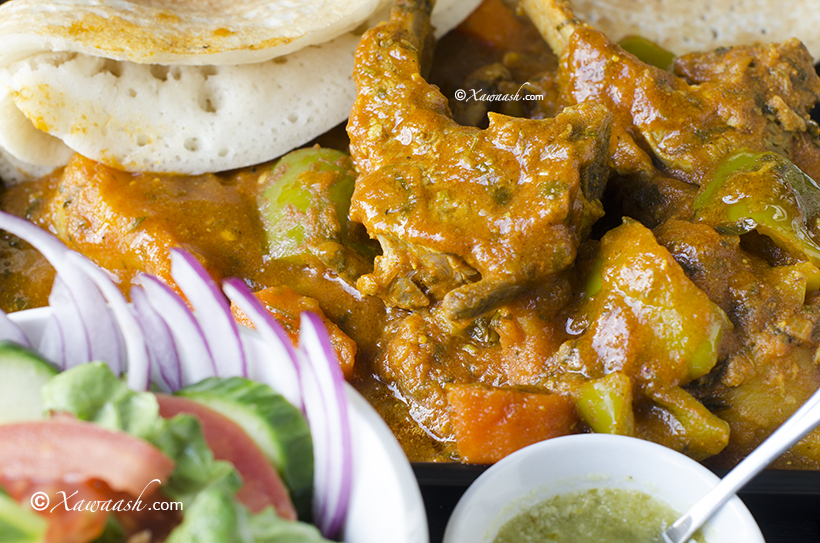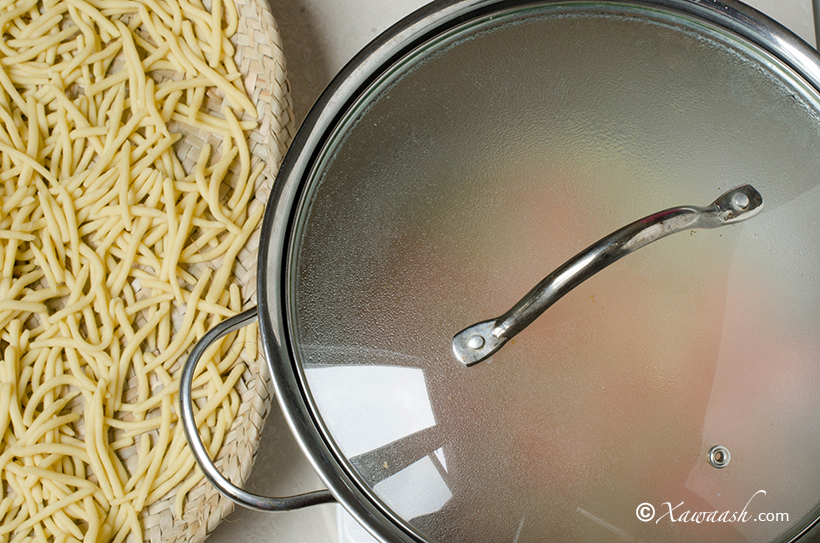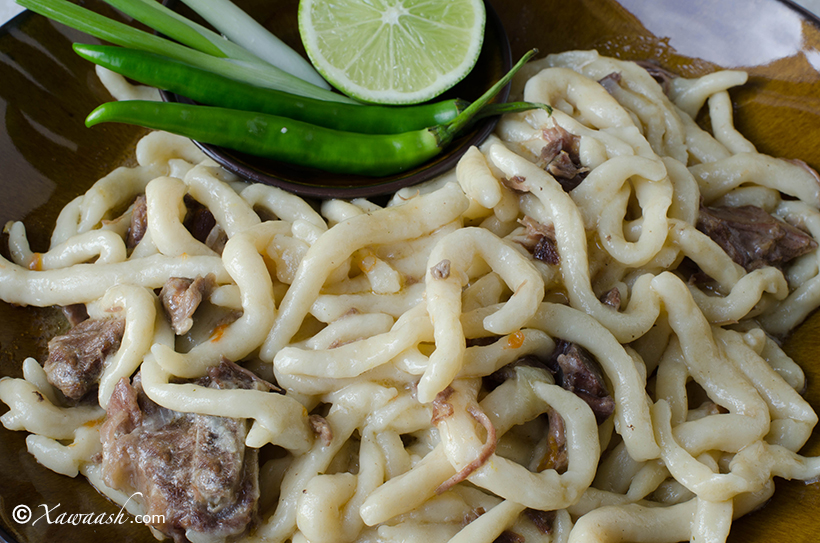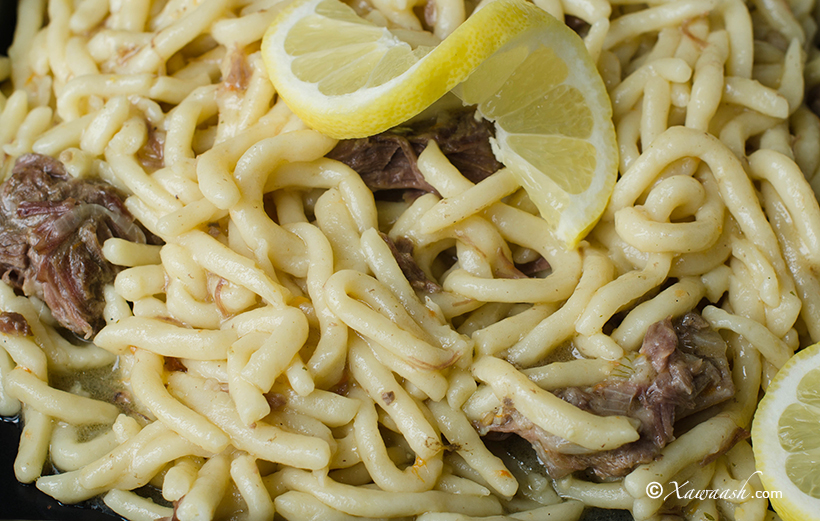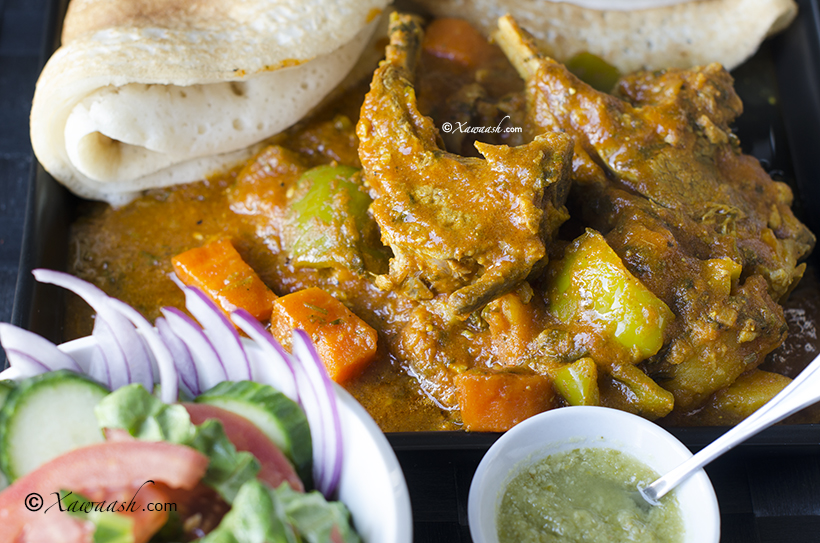
These past few days, it has been raining quite hard. We love watching heavy downpours when we are staying at home, curled up in a blanket, and having no need to go outside. These heavy rains coincide with the Gu which is the main rainy season (April to June) in Somalia. Back there, we used to love sitting in the veranda, watching and listening to the rain.
Weather like this calls for comfort food and what comfort food is better than Anjero with a nice, aromatic, and deeply flavourful lamb stew. OK, there are some of you out there who have not had lamb or do not like the strong flavour of lamb. Rest assured. This is one lamb dish you really want to try. The aromatic spices, herbs, and the earthy flavour of the root vegetables temper some of the taste of the lamb. Still not convinced? In that case, substitute the lamb with chicken or beef, or make it vegetarian, and you will still end up with a stew that will make your taste buds and tummy really thankful.
This dish is about adding the different ingredients each at its right time. The lamb should be soft and tender, and the vegetables should retain their shape. The potatoes should not be cut into large cubes, since potatoes take longer to soften in acidic liquids like tomato sauces.
As some of you have noticed, we use more oil when cooking stews. The oil is important as it will “fry” the stew and give it a nice, caramelly taste. When the stew is ready, the oil separates and floats at the top, making it very easy to remove. Adding enough oil also helps in preventing the stew from sticking to the pot and burning. That is the rationale for the extra oil we use when cooking stews or tomato sauces in general.
Then it was time to sit down and do what Somalis have been doing for a very long time: scooping the stew on top of Anjero. Wait, do not sit down yet. Turn on some Qaraami music, a Somali musical style played with Kaban (Oud). The word Qaraami comes from the Arabic word غرامي which means romantic. What is most important to know though, is that Qaraami goes really well with maraq (stews).
Apart from Anjero, this stew can also be served with Soor (grits), plain rice, Sabaayad (chapati), or a nice, crusty bread. Somalis would also eat this with pasta and it would make an amazing sauce instead of regular pasta sauce.
Ingredients:
(Tbsp is a tablespoon; tsp is a teaspoon)
(1 cup = 237 mL = 2.4 dl; 1 Tbsp = 15 mL; 1 tsp = 5 mL); all are level measurements
- ⅓ cup (79 mL) Canola oil – Or vegetable oil
- 1 Large Onion (sliced)
- 3 Garlic cloves (minced)
- 1 tsp (5 mL) Fresh ginger (grated)
- 2 tsp (10 mL) Fenugreek seeds (ground)
- 1 Tbsp (15 mL) Xawaash
- 1 tsp (5 mL) Turmeric powder
- 1½ lb (680 g) Lamb – Or goat meat
- 4 Large (800 g) Tomatoes (blended)
- 3 Tbsp (45 mL) Tomato paste
- 2 tsp (10 mL) Salt (to taste)
- 2 Medium (350 g) Potato (cubed)
- 2 Medium (230 g) Carrot(s) (sliced)
- 1 Green pepper (chopped)
- 1 Tbsp (15 mL) Green chilli sauce – Or to taste
- ½ cup (80 g) Cilantro (chopped) – UK: coriander
- ½ tsp (2.5 mL) Ground black pepper
Directions:



- In a pan set on medium heat, saute the onions in the oil for 3 minutes. Add the garlic and fry for one minute then add the ginger and mix well.
- Add the fenugreek, xawaash and turmeric. Mix well after each addition.
- Add the meat right after, so the spices don’t burn. Brown for 3 minutes.
- Add the blended tomatoes and mix.
- Add the tomato paste and stir well. Cover and cook for 30 minutes.
- Add the potatoes and carrots. Cover and cook for another 20 minutes.
- Add the green pepper and cook for 10 more minutes.
- Add the chili sauce and cilantro. Stir well.
- Add the black pepper and stir. Serve hot with anjero.
Mukawinaadka:
(QW waa qaaddo weyn – midda cuntada lagu cuno; qy waa qaaddo yar)
(1 koob = 237 mL = 2.4 dl; 1 QW = 15 mL; 1 qy = 5 mL)
- ⅓ koob (79 mL) Saliid caddeey
- 1 Basal , Weyn (jarjaran)
- 3 Tuun (toon) (shiidan)
- 1 qy (5 mL) Sanjabiil cusboon (la xoqay)
- 2 qy (10 mL) Xulbad (shiidan)
- 1 QW (15 mL) Xawaash
- 1 qy (5 mL) Huruud shiidan
- 1½ baawun (680 g) Hilib idaad (ari)
- 4 (800 g) Yaanyo , Weyn (shiidan)
- 3 QW (45 mL) Yaanyo shiishiid
- 2 qy (10 mL) Cusbo (inta dooqaaga ah)
- 2 (350 g) Bataato / baradho , Dhexdhexaad ()
- 2 (230 g) Karooto (dabacase) , Dhexdhexaad (jarjaran)
- 1 Barbarooni cagaaran (jarjaran)
- 1 QW (15 mL) Basbaas cagaar shiidan
- ½ koob (80 g) Kabsaro caleen (jarjaran)
- ½ qy (2.5 mL) Filfil madoow shiidan
Diyaarinta:



- Digsi dab dhexdhexaad ah saaran saliidda ku shub. Basasha dallac muddo 3 daqiiqo. Ku dar tuunta (toonta), hal daqiiqana shiil. Sanjabiisha ku dar, si fiicanna u walaaq.
- Ku dar xulbadda, xawaashka iyo huruudda. Walaaq mid walba markaad ku dartid.
- Hilibka ku dar, walaaqna ilaa uu ka gaduuto, muddo 3 daqiiqo.
- Yaanyada ku dar ee si fiican u walaaq.
- Yaanyo shiishiidka ku dar, kaddibna walaaq. Dabool ha karo muddo 30 daqiiqo.
- Bataatada iyo karootada ku dar. Dabool ha karo muddo 20 daqiiqo.
- Barbarooniga ku dar, 10 daqiiqo oo kalena kari.
- Basbaaska iyo kabsara caleenta ku dar.
- Filfisha madoow ku dar, si fiicanna u walaaq. Maraqa kulul canjeero ama soor ku cun.
المقادير
كوب = 237 مل، ملعقة كبيرة = 15 مل، ملعقة صغيرة = 5 مل
| زيت الكانولا | كوب | ⅓ |
| (بصل( مقطع شرائح | 1 | |
| (فص ثوم( مفروم | 3 | |
| (زنجبيل طازج( مبشور | ملعقة صغيرة | 1 |
| (حبوب الحلبة( مطحون | ملعقة صغيرة | 2 |
| حوائج | ملعقة كبيرة | 1 |
| مسحوق الكركم (الهرد) | ملعقة صغيرة | 1 |
| خروف/ | جم | 680 |
| (طماطم( مضروبة في الخلاط | جم | 800 |
| معجون طماطم | ملعقة كبيرة | 3 |
| (ملح( حسب الرغبة | ملعقة صغيرة | 2 |
| (بطاطا( مكعبة | جم | 350 |
| (جزر( مقطع شرائح | جم | 230 |
| فلفل اخضر/ فلفل رومي | 1 | |
| البسباس الاخضر | ملعقة كبيرة | 1 |
| كزبرة | جم | 80 |
| فلفل اسود مطحون | ملعقة صغيرة | ½ |
طريقة التحضير:



| فى قدر على نار متوسطة يحمر البصل فى الزيت لمدة 3 دقائق، يضاف الثوم ويحمر لمدة دقيقة واحدة، ثم يضاف الزنجبيل ويحرك جيدا | -1 |
| تضاف الحلبة، الحوائج (بهارات مشكلة) ومسحوق الكركم (الهرد) ويحرك جيدا | -2 |
| يضاف اللحم، يحرك ويحمر لمدة 3 دقائق | -3 |
| تضاف الطماطم ويحرك جيدا | -4 |
| يضاف معجون الطماطم ويحرك المرق جيدا ثم يغطى ويطهى لمدة 30 دقيقة | -5 |
| يضاف البطاطس والجزر، يغطى المرق ويطهى لمدة 20 دقيقة اخرى | -6 |
| يضاف الفلفل الاخضر، يغطى ويطهى لمدة 10 دقائق | -7 |
| يضاف صوص البسباس والكزبرة | -8 |
| يضاف الفلفل الاسود ويحرك جيدا، يقدم المرق ساخنا | -9 |
]]>

When Leila’s mother, Maedo, came from the UK to visit us for a few days last week, it was only natural that we would prepare the video for Kalamudo that many of you have been requesting for so long. She told us that instead of repeating the previous recipe, she will make a variation of it. That way the video will be useful for those using the original recipe as well as the new one.
Preparing the kalamudo was an enjoyable experience and we all had the chance to sit around the isharafa (woven mat) and remember the olden days in Brava, Somalia. It was a delightful trip down memory lane, reminiscing about places, people, and special times. We ran out of dough several times and we prepared several batches of kalamudo. We also had to use instant stock when we ran out of broth. The stories, however, were plentiful and seemed endless, made sweeter by the swishing sounds of palms rolling noodles.
Batch after batch was frozen in a ltelo (winnowing basket) before being placed in freezer bags for storage in the freezer. Then some of the kalamudo was cooked and we sat down and enjoyed a very tasty meal; tastier than any other kalamudo we could remember. It was as if the noodles were made more delicious by the stories trapped in them.
Ingredients:
(Tbsp is a tablespoon; tsp is a teaspoon)
(1 cup = 237 mL = 2.4 dl; 1 Tbsp = 15 mL; 1 tsp = 5 mL); all are level measurements
- 2 lb (900 g) Bone-in beef shoulder (cubed)
- 14 cups (3.5 litres) Water
Dough:
- 6 cups (840 g) All-purpose (plain) flour
- 1 tsp (5 mL) Salt
- ⅓ cup (67 g) Sugar
- ¼ cup (59 mL) Canola oil – Or vegetable oil
- 1 cup (225 g) Potato (mashed)
- 1 Large Egg – Or 2 Tbsp oil
- 1¼ cups (300 mL) Broth
Rest of the ingredients:
- ¾ cup (178 mL) Canola oil – Or vegetable oil
- 1 Large Onion (sliced)
- 3 Garlic cloves (minced)
- 1 Large Tomato (sliced)
- 2 tsp Vegetable seasoning salt
- 8 cups (2 litres) Broth
- 2 Tbsp (30 mL) Vinegar
Directions:

- Place the meat in an 8-litre pot set on high heat and add the water.
- Skim away the impurities. Let it simmer for one and half hour or till the meat becomes tender.
- The broth



- Combine the flour, salt, and sugar. Add the oil and egg.
- Gradually add one and a quarter cup of the broth and mix. This broth can be romved from the pot after 30 minutes.
- Add the mashed potato and mix. Knead well.
- Divide into the dough into six equal pieces. Spread the dough into a ¼ inch (~0.5 cm) thickness and cut into 4 strips.
- Cut the strips as shown.
- Shape the noodles in the palm of your hands as shown in the video.


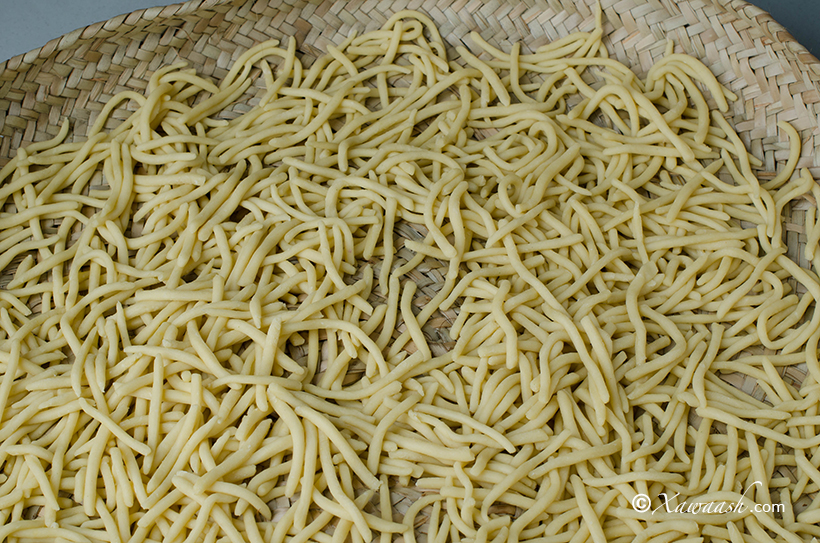

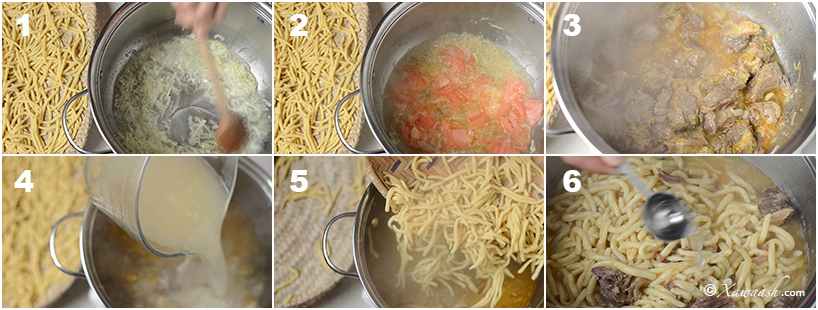
- Saute the onion in the oil using high heat till translucent then add the garlic. Cook for 2 more minutes.
- Add the tomato and cook for 5 minutes.
- Add the meat and seasoning salt. Stir well. Cook for 8 to 10 minutes.
- Add 8 cups (2 litres) of the hot broth.
- Add the Kalamudo and stir. Cook for 10 minutes on medium heat. Do not over stir.
- Add the vinegar and serve hot and moist.
Maqaaddiirta:
(QW waa qaaddo weyn – midda cuntada lagu cuno; qy waa qaaddo yar)
(1 koob = 237 mL = 2.4 dl; 1 QW = 15 mL; 1 qy = 5 mL)
- 2 baawun (900 g) Garab lo’aad oo lafo leh ()
- 14 koob (3.5 litre(s)) Biyo
Cajiin:
- 6 koob (840 g) Bur cad
- 1 qy (5 mL) Cusbo
- ⅓ koob (67 g) Sokor
- ¼ koob (59 mL) Saliid caddeey – Ou dâ€
 huile végétale
huile végétale - 1 koob (225 g) Bataato / baradho (la burburiyay)
- 1 Ukun , Weyn – Ou 2 cs dâ€
 huile
huile - 1¼ koob (300 mL) Fuud
Mukawinaadka kale:
- ¾ koob (178 mL) Saliid caddeey – Ou dâ€
 huile végétale
huile végétale - 1 Basal , Weyn (jarjaran)
- 3 Tuun (toon) (shiidan)
- 1 Yaanyo , Weyn (jarjaran)
- 2 qy Boolboro maraq qudaar
- 8 koob (2 litre(s)) Fuud
- 2 QW (30 mL) Qal
Diyaarinta:

- Hilibka ku digsi 8 litir qaada ku rid. Biyaha ku shub. Dab sare ku kari.
- Xumbada ka qaad. Dab yar ku kari muddo hal saac iyo bar ama ilaa uu hilibka ka bislaado.
- Fuudka



- Burka, cusbada iyo sokorta isku dar. Saliidda iyo ukunta ku dar.
- Kis kis ugu dar koob iyo rubi oo fuudka ah, iskuna qas. Fuudkaan waxaa digsiga ka qaadan kartaa nus saac kaddib.
- Bataatada (baradhada) ku dar, kuna qas. Si fiican u rifaaq.
- Cajiinka 6 gabal isle’eg ka dhig. U fidi buurni ¼ inch (~0.5 cm). Cajiinka aad fidisay, afar gabal ka dhig.
- U jar sida sawirka aad ka aragtid.
- Kalaamuddada u sameey sida fiidiyaha aad ka arki kartid.





- Basasha iyo saliidda isku dalac adigoo dab sare isticmaaleysid. Tuunta ku dar. Kari 2 daqiiqo oo kale.
- Yaanyada ku dar. Kari muddo 5 daqiiqo.
- Hilibka iyo maraq qudaarta budada ah ku dar. Si fiican u walaaq.
- Ku dar 8 koob (2 litir) fuudka oo kulul.
- Kalaamuddada ku dar ee wax yar walaaq. Dab dhexdhexaad ku kari muddo 10 daqiiqo. Wax badan ha walaaqin.
- Qalka ku dar, waxaana kalaamuddada qaddintaa iyadoo kulul oona qoyyan.
Quand la mère de Leila, Maedo, est venue du Royaume Uni nous rendre visite quelques jours la semaine dernière, c’était l’occasion parfaite pour nous de réaliser la vidéo des kalamudo que beaucoup d’entre vous nous demandent depuis si longtemps. Elle nous a annoncé que plutôt que de refaire la recette précédente, elle allait en faire une variation. Comme ça la vidéo sera utile pour ceux qui feront la recette originale aussi bien que la nouvelle.
La préparation des kalamudo était une expérience très agréable, tous assis autour de l’isharafa (tapis tressé) nous rappelant le bon vieux temps à Brava, Somalie. Comme un voyage dans le passé où nous avons évoqué les lieux, gens et occasions spéciales. Nous avons manqué de pâte à plusieurs reprises et nous avons préparé plusieurs fournées de kalamudo. Nous avons utilisé du bouillon instantané une fois le bouillon épuisé. Les histoires, elles, étaient nombreuses et interminables, adoucies par le son du frottement des paumes de mains roulant les nouilles.
Nous avons congelé chaque fournée dans un ltelo (panier en vannerie) avant de les mettre dans des sacs congélation pour les stocker. Puis nous avons cuit et dégusté avec plaisir quelques kalamudo, les meilleurs que nous avons jamais mangé. Comme si les nouilles étaient plus savoureuses grâce aux histoires qui avaient été contées pendant leur préparation.
Imprimer la Recette avec Photos
Ingrédients:
(cs est cuillère à soupe; cc est cuillère à café)
(1 mesure = 237 mL = 2.4 dl; 1 cs = 15 mL; 1 cc = 5 mL); mesures à ras
Bouillon:
- 2 livres (900 g) d’Epaule de Boeuf (en cubes)
- 14 mesures (3.5 litres) d’Eau
Pâte:
- 6 mesures (840 g) de Farine Blanche
- 1 cc (5 mL) de Sel
- ⅓ mesure (67 g) de Sucre
- ¼ mesure (59 mL) d’Huile de Colza – Ou d’huile végétale
- 1 mesure (225 g) de Pomme de Terre (écrasée)
- 1 Gros Oeuf – Ou 2 cs d’huile
- 1¼ mesure (300 mL) de Bouillon
Ingrédients restants:
- ¾ mesure (178 mL) d’Huile de Colza – Ou d’huile végétale
- 1 Gros Oignon (émincé)
- 3 Gousses d’Ail (hachées)
- 1 Grosse tomate (tranchée)
- 2 cc d’Assaisonnement Légumes
- 8 mesure (2 litres) de Bouillon
- 2 cs (30 mL) de Vinaigre
Instructions:

- Mettre la viande dans un fait tout de 8 litres chauffé à feu fort et verser l’eau.
- Écumer les impuretés. Laisser mijoter une heure et demie ou jusqu’à ce que la viande soit tendre.
- Le bouillon



- Mélanger la farine, le sel, et le sucre. Ajouter l’huile et l’oeuf.
- Petit à petit ajouter une mesure un quart de bouillon et mélanger. Le bouillon peut être prélevé dans la marmite au bout de 30 minutes.
- Ajouter la pomme de terre écrasée et mélanger. Bien pétrir.
- Couper la pâte en 6 morceaux de taille égale. Étaler la pâte à ¼ de pouce (~ 0.5 cm) d’épaisseur et couper en 4 bandes.
- Recouper les bandes comme montré ci-dessus.
- Rouler les nouilles avec les paumes de la main comme montré dans la vidéo.





- Faire sauter les oignons dans l’huile à feu fort jusqu’à ce qu’ils deviennent translucides puis ajouter l’ail. Cuire 2 minutes de plus.
- Ajouter la tomate et cuire 5 minutes.
- Ajouter la viande et l’assaisonnement. Bien mélanger. Cuire 8 à 10 minutes.
- Ajouter 8 mesures (2 litres) de bouillon chaud.
- Ajouter les kalamudo et touiller. Cuire 10 minutes à feu moyen. Ne pas trop tourner.
- Ajouter le vinaigre et servir les kalamudo chauds et moelleux.
المقادير
كوب = 237 مل، ملعقة كبيرة = 15 مل، ملعقة صغيرة = 5 مل
| حِساء | ||
| (لحم بقري من الكتف بعظم( مكعبة | جم | 900 |
| ماء | كوب | 14 |
| عجين | ||
| طحين ابيض متعدد الأغراض | جم | 840 |
| ملح | ملعقة صغيرة | 1 |
| سكّر | جم | 67 |
| زيت الكانولا | كوب | ¼ |
| (بطاطا( مهروس | جم | 225 |
| بيض | 1 | |
| حِساء | كوب | 1¼ |
| باقي المكونات | ||
| زيت الكانولا | كوب | ¾ |
| بصل | 1 | |
| (فص ثوم( مفروم | 3 | |
| طماطم | 1 | |
| مسحوق مرقة الخضار | ملعقة صغيرة | 2 |
| حِساء | كوب | 8 |
| خلّ | ملعقة كبيرة | 2 |
طريقة التحضير:
| يوضع اللحم فى قدر سعة 8 لتر ويضاف اليه الماء. ويترك على نار عالية حتى يصل الماء الى درجة الغليان. | -1 |
| تخفض النار وتزال الرغوة. يطهى اللحم على نار هادئة لمدة ساعة ونصف اوحتى ينضج تماما. | -2 |
| المرق | -3 |



| يخلط الطحين، الملح، والسكر. يضاف الزيت والبيض. | -1 |
| يضاف كوب وربع من المرق تدريجيا وتخلط المقادير | -2 |
| تضاف البطاطس المهروسة وتخلط جيدا ثم تعجن جيدا | -3 |
| تقسم العجينة الى 6 قطع متساوية. تفرد العجينة الى سماكة نصف سم ثم تقطع الى اربع قطع | -4 |
| تقطع العجينة كما هو مبيّن فى الصورة | -5 |
| تشكل الكَـلامُـدّة باليد | -6 |





| يحمر البصل فى الزيت ويستعمل نار عالية ثم يضاف الثوم ويحمر لمدة دقيقتين | -1 |
| تضاف الطماطم وتطهى لمدة 5 دقائق | -2 |
| يضاف اللحم ومسحوق مرق الخضارو ويطهى لمدة 8 الى 10 دقائق | -3 |
| يضاف 2 لتر من المرق الساخن | -4 |
| تضاف الكلامدّة وتقلب قليلا، تطهى على نار متوسطة لمدة 10 دقائق | -5 |
| يضاف الخل وتقدم الكَـلامُـدّة وهي رطبة جدا وساخنة | -6 |
]]>
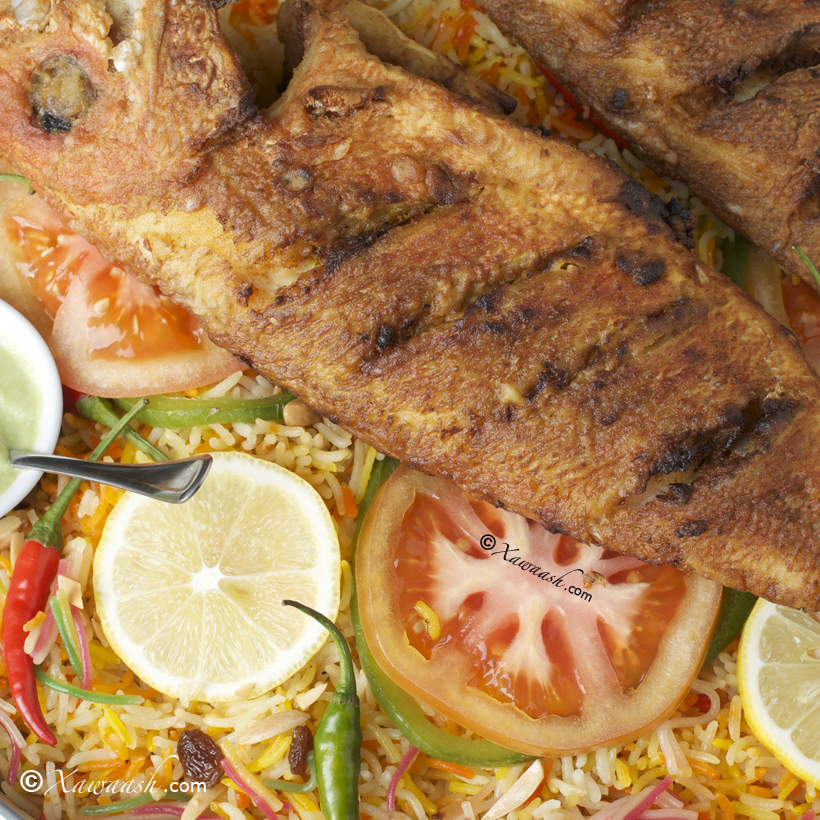
Sometimes people make the weirdest assumptions. They engage in stereotyping that may not end up too well for them. Like the woman who came to visit my mother at our home in Mogadishu. I was thirteen then, and at that time I was sitting under the shade of a tree in our yard. I was half reading Mark Twain’s The Adventures of Tom Sawyer and half daydreaming.
On her way out, our visitor turned around and said to my mother, “I need to buy some fish. Can you send your son with me to the fish market?” I never before set foot in the fish market and did not have the slightest clue on how to buy fish. Since we were originally from Brava, it was assumed that all Bravanese, including toddlers, were experts when it came to fish. Without waiting for my mother’s response, I laid down my book and followed her to her car.
That may sound strange, but not for Somalis. We never let on that we don’t know. Not knowing is a sign of weakness. We don’t have proverbs or other wise sayings extolling the virtues of not saying I don’t know. We don’t have Mark Twains telling us, “To succeed in life, you need two things: ignorance and confidence.” It was in the air and you just picked it up.
I remembered a saying by Albert Einstein, “Imagination is more important than knowledge.” With the way I used to daydream in those days, imagination was something I had plenty of. And I used it at that fish market.
I can report that we never saw that lady again. If she was alive and did not choke on the bones of the fish that I picked for her, then she was probably very upset with me. I still believe that it was 100% her fault. She should have done her homework and known that I didn’t know.
Ingredients:
(Tbsp is a tablespoon; tsp is a teaspoon)
(1 cup = 237 mL = 2.4 dl; 1 Tbsp = 15 mL; 1 tsp = 5 mL); all are level measurements
Serves 4 to 6 people
- 2 x 1 lb (900 g) Red snapper (whole)
- 2 Garlic clove(s)
- 2 tsp (10 mL) Salt
- 1 tsp (5 mL) Fresh ginger (grated)
- 1 tsp (5 mL) Ground black pepper
- 1 tsp (5 mL) Turmeric powder
- 2 tsp (10 mL) Xawaash
- 2 Tbsp (30 mL) Lemon juice
- 1 cup(s) (140 g) All-purpose (plain) flour
- Canola oil – For deep frying

Tips for buying fish: Fresh fish is shiny and is not smelly. It has clear, bulging eyes & bright red gills. It also has firm flesh that bounces back when pressed lightly.

Directions:

- Score both sides of the fish. Wash and pat dry.
- In a mortar, combine the garlic and salt. Crush and make into a paste.
- Add the fresh ginger, ground black pepper, turmeric powder, xawaash, and the lemon juice. Mix well. You can substitute the xawaash with berbere or curry powder, or cumin powder.
- Rub the marinade all over the fish.
- Marinate the cavity. If you have time, refrigerate the fish for 1 to 2 hours. If not, then fry it right away.
- Place the flour in a dish and place the fish in the flour.
- Coat well with the flour.
- Fry in canola oil at 375°F/190°C. Use medium heat on the stovetop. Make sure the oil is deep enough to cover the whole fish.
- Fry each fish for 3 to 4 minutes or until it is cooked through and the skin becomes crispy.
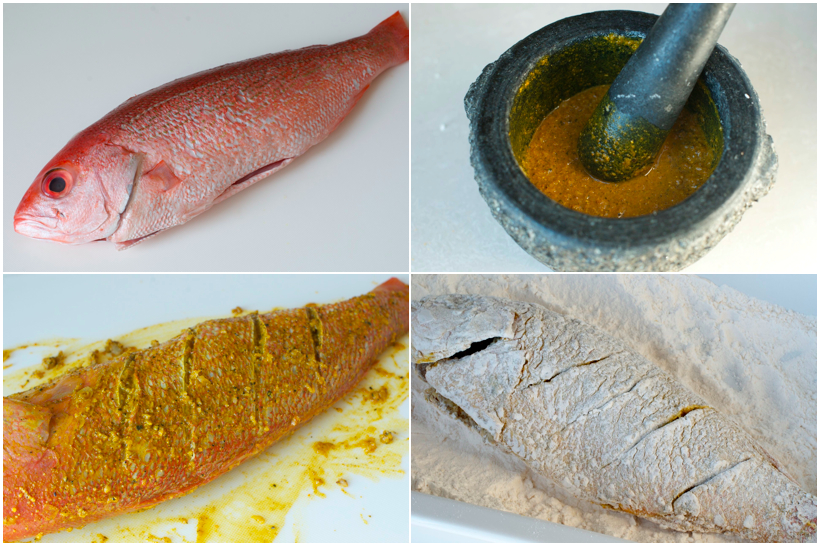


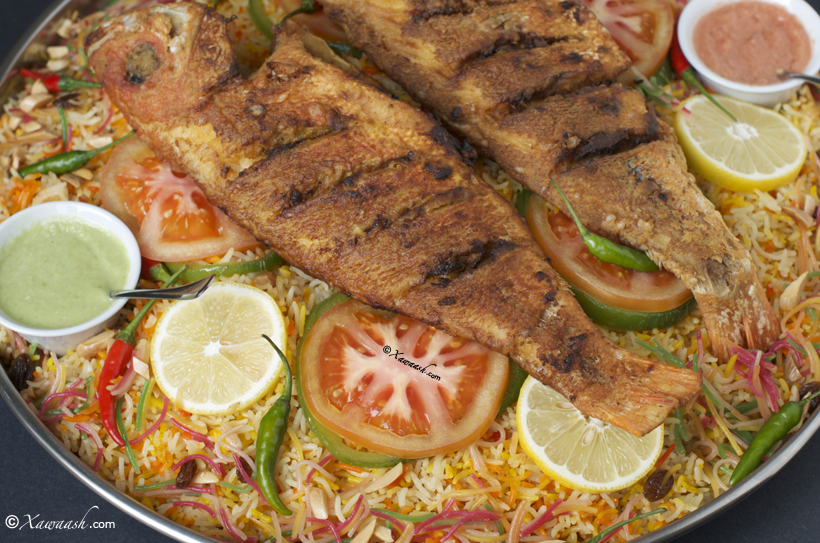


Waxaa la yaab leh sida dadka qaarkood ay u aaminsan yihiin fikrado aan sal lahayn. Ma oga inay dadka isku wada mid ahayn. Dadka sidaas ah, waxay fikradahaas kala kulmaan jab weyn. Waxaa tusaale u ah naag hooyadayda ku soo booqatay gurigeenna ku yaal magaalada Xamar (Muqdisho). Markaas waxaan jiray saddex iyo toban sano, waqtigaasna waxaan fadhiyay deedka anigoo buug ku aqrisanaaya geed hoostiisa. Buugga wuxuu ahaa The Adventures of Tom Sawyer oo uu qoray Mark Twain. Bog walba wuxuu iga qaadanaaya waqti aad u fara badan, sababtoo ah maskaxdayda waxay kaloo ku mashquulsanayd daarro aan samada ka dhisaayay.
Islaantii nasoo booqatay, markay sii baxaysay, ayay hooyadayda ku tiri, “Kalluun ayaa rabaa inaan soo iibsado. Wiilkaaga ma ii raaci karaa suuqa kalluunka?” Aniga weligay suuqa kalluunka cag ma saarin, kalluunka sida loo xusho fikrad haba yaraatee kama qabin. Maaddaama aan nahay reer Baraawe, dadka qaarkood waxay aaminsan yihiin inaan daadinay cilmiga kalluunka. Waxaa dhici karta in la helo dad aaminsan in caruurta reer Baraawaha ay kusoo koreen caanaha kalluunka. Aniga ma sugin inay hooyaday jawaabto. Buugga ayaan iska dhigay, horeyna ayaan islaantii u raacay.
Arrintaas waxaa dhici karta inay dadka qaarkood la yaabaan, laakiin annaga haddaan Soomaali nahay, taas caadi ayay nala tahay. Ma jeclin in nala ogaado inaynaan wax aqoon oo naloo arko inaan doqon nahay. Ilama aha inay jiraan maahmaahyo ama murti kale oo dadka ku dhiiragelinaaya inaysan dhihin waxaas ma aqaani. Qof inoo sheegayna ma jiro, laakiin waa wax aan iska baranay sida neefsashada oo qofna na barin.
Reer galbeedka intaysan farta nagu fiiqin ama nagu qoslin, waxaan soo xusuusinaayaa hadal iyaga murti u leh oo uu qoray Mark Twain. Wuxuu yiri, “Laba wax ayaa u baahan tahay haddaad rabtid inaad nolosha ku guuleeysatid: aqoondarro iyo kalsooni.” Armuu gumeeysiga waxaas inoo keenay?
Maalintaas kaddib, islaantii mar dambe ma aynaan arag. Haddii ay weli noolayd oo uusan dhuunta u istaagin lafaha kalluunka aan u xulay, waxay ila tahay inay aad iigu careeysnayd. Ilaa maantadaan waxaan aaminsanahay inay ayada arrintaas 100% mas’uul ka ahayd. Ayada ayaa laga rabay inay ogaato inaan aniga waxba aqoon. Ayada ayaa doqon wadatay.
Maqaaddiirta:
(QW waa qaaddo weyn – midda cuntada lagu cuno; qy waa qaaddo yar)
(1 koob = 237 mL = 2.4 dl; 1 QW = 15 mL; 1 qy = 5 mL)
Ku filan 4 ilaa 6 qofood
- 2 x 1 baawun (900 g) Mallaay gaduud (dhan)
- 2 Tuun (toon)
- 2 qy (10 mL) Cusbo
- 1 qy (5 mL) Sanjabiil cusboon (la xoqay)
- 1 qy (5 mL) Filfil madoow shiidan
- 1 qy (5 mL) Huruud shiidan
- 2 qy (10 mL) Xawaash
- 2 QW (30 mL) Casiir liin dhanaan
- 1 koob (140 g) Bur cad
- Saliid caddeey – Lagu shiilo

Sida loo doorto (xusho) kalluunka (mallaayga) fiican: Kalluunka fiican wuxuu leeyahay dhaldhalaal, mana laha ur. Indhaha waa inay yihiin dhalo oo kale, aysan godnayna. Haddaad farta ku ruuxdid, waa inay god ku reebin.

Diyaarinta:

- Kalluunka labada dhinac ka sar. Dhaq, kaddibna qallaji.
- Tuunta iyo cusbada kasha ku rid. Si fiican isku shiid.
- Ku dar sanjabiisha la xoqay, filfisha madoow, huruudda, xawaashka, iyo casiirka liin dhanaanta. Si fiican isku qas.
- Kalluunka (mallaayga) si fiican u wada mari.
- Gudahana si fiican u mari. Haddaad doontid, qaboojiyaha geli muddo 1 ilaa 2 saacadood. Haddii kale, hore ka shiil.
- Burka saxan fidsan ku shub. Kalluunka (mallaayga) ku rid.
- Burka si fiican u mari.
- Waxaa ku shiishaa saliid caddeey kuleylkeeda yahay 375°F/190°C. Dab dhexdhexaad ah isticmaal. Hubi inay saliidda kalluunka wada daboosho.
- Kalluunka (mallaayga) midkiiba shiil muddo 3 ilaa 4 daqiiqo, ama ilaa uu ka bislaado, maqaarkana ka qababacleeyo.






Parfois les gens font les suppositions les plus bizarres. Ils font de stéréotypes qui peuvent leur créer des mauvaises surprises. Comme la femme qui a rendu visite à ma mère dans notre maison de Mogadishu. J’avais treize ans à l’époque, et à ce moment là j’étais assis à l’ombre d’un arbre dans notre jardin. J’étais à moitié en train de lire Les aventures de Tom Sawyer de Mark Twain et à moitié en train de rêver.
Alors qu’elle était sur le point de partir, notre visiteuse se retourna et dit à ma mère: “ J’ai besoin d’acheter du poisson. Permettez-vous que votre fils aille avec moi au marché aux poissons?” Je n’avais jamais mis les pieds au marché aux poissons et je ne savais absolument pas comment il fallait acheter du poisson. Comme nous étions originaires de Brava, les gens supposaient que tous les Bravanais, même les bébés, étaient des experts en poisson. Sans attendre la réponse de ma mère, je posai mon livre et la suivis à sa voiture.
Cela peut sembler étrange, mais pas pour les Somalis. Nous ne montrons pas que nous ne savons pas. Ne pas savoir est un signe de faiblesse. Nous n’avons pas de proverbes ou d’expressions qui célèbrent les vertus de ne pas dire Je ne sais pas. Nous n’avons pas Mark Twain qui nous dit: “ Pour réussir dans la vie, il vous faut deux choses: l’ignorance et la confiance en soi”. C’était dans l’air et on l’apprenait comme ça.
Je me rappellai une citation de Albert Einstein: “L’imagination est plus importante que le savoir.” Comme je rêvais souvent éveillé à cette époque, j’avais plein d’imagination à revendre. Et je m’en suis servi au marché aux poissons.
Je tiens à signaler que nous n’avons jamais revu cette dame. Si elle était encore vivante et qu’elle ne s’était pas étouffée sur les arêtes du poisson que j’ai choisi pour elle, elle était sûrement très fâchée contre moi. Je suis convaincu que c’était 100% de sa faute. Elle aurait dû se renseigner et savoir que je ne savais pas.
Imprimer la Recette avec Photos
Ingrédients:
(cs est cuillère à soupe; cc est cuillère à café)
(1 mesure = 237 mL = 2.4 dl; 1 cs = 15 mL; 1 cc = 5 mL); mesures à ras
Pour 4-6 personnes
- 2 Vivaneaux de 1 livre chacun (900 g)
- 2 Gousses d’Ail
- 2 cc (10 mL) de Sel
- 1 cc (5 mL) de Gingembre Frais (râpé)
- 1 cc (5 mL) de Poivre Noir moulu
- 1 cc (5 mL) Poudre de Curcuma
- 2 cc (10 mL) de Xawaash
- 2 cs (30 mL) de Jus de Citron
- 1 mesure (140 g) de Farine Blanche ménagère
- Huile de Colza – Pour la friture

Astuces pour acheter du poisson: Un poisson frais est brillant et ne sent pas. Ses yeux sont clairs et saillants, ses branchies sont bien rouges. Sa chair est ferme et rebondit quand on la presse légèrement.

Instructions:

- Entailler les poissons des deux côtés. Laver et sécher.
- Dans un mortier, mettre l’ail et le sel. Écraser et réduire en pâte.
- Ajouter le gingembre frais, le poivre noir moulu, la poudre de curcuma, le xawaash, et le jus de citron. Bien mélanger. Vous pouvez substituer le xawaash par du berbere ou de la poudre de curry, ou de la poudre de cumin.
- Étaler la marinade sur tout le poisson.
- Étaler la marinade à l’intérieur des poissons. Si vous avez le temps, réfrigérer les poissons 1 à 2 heures. Sinon, les frire tout de suite.
- Verser la farine dans un plat et rouler les poisson dans la farine.
- Bien les recouvrir de farine.
- Frire dans l’huile de colza à 375°F/190°C. Utiliser un feu moyen sur la cuisinière. Assurez-vous qu’il y ait assez d’huile pour couvrir le poisson entier.
- Frire chaque poisson 3 à 4 minutes ou jusqu’à ce qu’ils soient cuits à coeur et que la peau soit tendre.






المقادير
كوب = 237 مل، ملعقة كبيرة = 15 مل، ملعقة صغيرة = 5 مل
يكفي 4 الى 6 اشخاص
| (سمك النهاش الأحمر( كامل | جم | 900 |
| فص ثوم | 2 | |
| ملح | ملعقة صغيرة | 2 |
| (زنجبيل طازج( مبشور | ملعقة صغيرة | 1 |
| فلفل اسود مطحون | ملعقة صغيرة | 1 |
| مسحوق الكركم (الهرد) | ملعقة صغيرة | 1 |
| حوائج | ملعقة صغيرة | 2 |
| عصير ليمون | ملعقة كبيرة | 2 |
| طحين ابيض متعدد الأغراض | جم | 140 |
| زيت الكانولا |

طريقة اختيار السمك الطازج: جلد السمك الطازج يكون لامعا، ورائحته ليست مزعجة. العيون شفافة والقرنية محدبة، ولون الخياشيم احمر فاتح. لحم السمك الطازج مشدود، والضغط لا يترك ترهلا.

طريقة التحضير:

| يشق السمك من الجهتين. يغسل ثم ينشف منه الماء. | -1 |
| يسحق الثوم مع الملح بواسطة هاون ومدقة. | -2 |
| يضاف الزنجبيل الطازج، الفلفل الاسمر المطحون، الكركم (هرد)، الحوائج، وعصير الليمون. تخلط التتبيله جيدا. يمكن استبدال الحوائج بكاري، او كامون مطحون، او اي بهارات اخرى. | -3 |
| يتبل السمك جيدا. | -4 |
| يتبل السمك من الداخل ايضا. يوضع في الثلاجة لمدة 1 الى 2 ساعة او يمكن قليه فور الانتهاء من التتبيل. | -5 |
| يوضع الدقيق في صحن، ثم يوضع فيه السمك. | -6 |
| يغمس السمك جيدا بالطحين. | -7 |
| يقلى السمك في زيت الكانولا على درجة حرارة 190 د.م. (375 ف). تستعمل نار متوسطة. يجب ان يغطي الزيت السمك كاملا. | -8 |
| تقلى كل حبة من السمك لمدة 3 الى 4 دقائق او الى ان ينضج السمك ويصبح مقرمشا. | -9 |






]]>

If you have never had a plantain, it tastes pretty much like a potato when a raw or semi-ripe plantain is cooked. We prepared this stew for some guests and they all thought they were eating potatoes.
Plantains are a staple food in southern Somalia and are added to both savoury and sweet dishes. In this post, we show two different methods of cooking plantains. For the stew, we used a semi-ripe plantain which is much easier to peel than a green one and takes much less time to cook. It is not recommended to use very ripe plantains in stews as they will easily disintegrate and will also make the stew taste too sweet.
For the fried plantains, we used ripe fruit that we sliced thinner. You could use semi-ripe plantains but when you fry them, they will taste like french fries. When you fry very ripe plantains, they taste almost like fried bananas. For most Somalis, this would be the perfect accompaniment to rice. It is a delightful combination of sweet and savoury.
Enjoy this traditional and delicious Somali stew.
Si vous n’avez jamais goûté de plantain, un plantain vert ou à moitié mûr aura un goût de pomme de terre une fois cuit. Nous avons préparé ce ragoût pour des invités et ils ont tous pensé qu’ils mangeaient des pommes de terre.
Les plantains sont un aliment de base dans le Sud de la Somalie et sont utilisés dans les plats aussi bien salés que sucrés. Dans cette recette, nous vous montrons deux méthodes différentes de cuisson des plantains. Pour le ragoût, nous avons utilisé un plantain à moitié mûr qui est beaucoup plus facile à peler qu’un plantain vert et nécessite beaucoup moins de cuisson. Il est déconseillé d’utiliser des plantains trop mûrs en ragoûts car ils se désintégreront et ils rendront le plat trop sucré.
Pour les plantains frits, nous avons utilisé un fruit mûr que nous avons tranché fin. Vous pouvez utiliser des plantains à moitié mûr mais quand vous les aurez frits, ils auront le même goût que des frites. Lorsque vous faites frire des plantains très mûrs, ils ont presque le même goût que des bananes frites. Pour la plupart des Somalis, ils sont l’accompagnement parfait du riz. C’est une combinaison délicieuse de sucré-salé.
Régalez-vous avec ce délicieux ragoût traditionnel Somali.
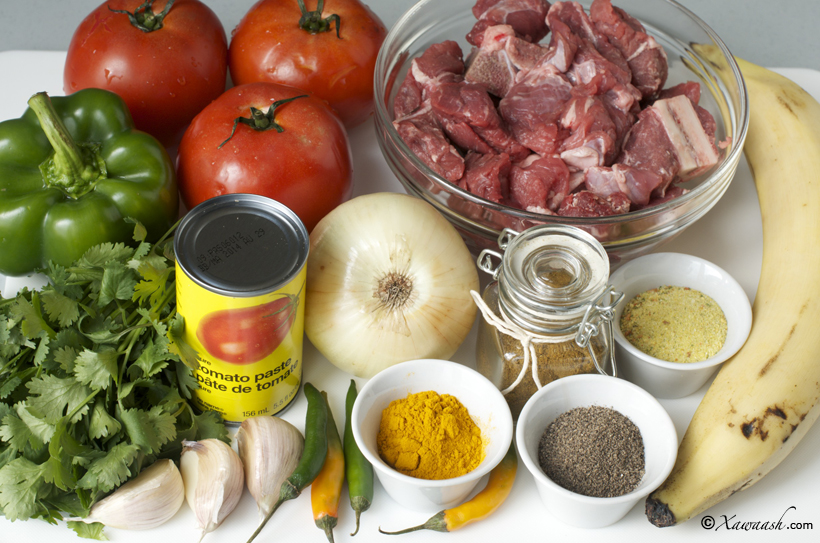
Ingredients:
(Tbsp is a tablespoon; tsp is a teaspoon)
(1 cup = 237 mL; 1 Tbsp = 15 mL; 1 tsp = 5 mL) all level measurements
(1 Tbsp Vegeta Seasoning Mix (18 g) = 2 Maggi or Knorr bouillon cubes = 2 tsp salt)
Serves 6
½ cup (118 mL) Canola oil
1 Onion (sliced)
3 Large garlic cloves (minced)
1 Tbsp (15 mL) Xawaash
1 tsp (5 mL) Turmeric powder
1 ½ lb (680 g) Beef shoulder with bones (cubed)
1 Tbsp (15 mL) Vegeta seasoning or 2 bouillon cubes (Maggi, Knorr, etc.) or 2 tsp salt
¼ tsp (1.25 mL) Black pepper (ground)
4 Hot peppers (optional)
3 Tomatoes (peeled & diced)
4 cups (948 mL) Hot water
1 Semi-ripe plantain (cut into 1″ or 2½ cm thick slices)
1 Green pepper (diced)
½ cup (118 mL) Cilantro (chopped)
Served with rice and fried plantains (find the recipes below)
Waxa loo baahan yahay:
(QW waa qaaddo weyn – midda cuntada lagu cuno; qy waa qaaddo yar)
(1 koob = 237 mL; 1 QW = 15 mL; 1 qy = 5 mL)
(1 QW maraq qudaar “Vegeta” = 2 mukacab Maggi ama Knorr = 2 qy cusbo)
Ku-filan 6 qofood
½ koob (118 mL) Saliid caddeey
1 Basal (jarjaran)
3 Tuun (toon) la-xoqay
1 QW (15 mL) Xawaash
1 qy (5 mL) Huruud
1½ lb (680 g) Garab lo’aad oo lafo leh (haddii aad hilibka aad u-jeceshahay, waxaa ka-dhigi kartaa 1 kiilo hilib)
1 QW (15 mL) Maraq qudaar Vegeta ama 2 Mukacab (Maggi, Knorr, iwm) ama 2 qy cusbo
¼ qy (1.25 mL) Filfil madoow (shiidan)
4 Basbaas cagaar (waa ka-dhaafi kartaa)
3 Yaanyo (oo la-fiiqay lana jarjaray)
4 koob (948 mL) Biyo kulul
1 Moos bukiini oo xoogaa bisil
1 Barbaooni cagaaran (la-jarjaray)
½ koob (118 mL) Kabsara caleen (la-jarjaray)
Waxaa lagu qaddimay bariis iyo moos bukiini la-shiilay (soo’da hoos ayay ku-qoran tahay)
Ingrédients:
(cs est cuillère à soupe; cc est cuillère à café)
(1 mesure = 237 mL; 1 cs = 15 mL; 1 cc = 5 mL) mesures à ras
(1 cs de Condiment Vegeta (18 g) = 2 bouillon cubes Maggi ou Knorr = 2 cc de sel)
Pour 6 personnes
½ mesure (118 mL) d’Huile de Colza
1 Oignon (émincé)
3 Grosses Gousses d’Ail (hachées)
1 cs (15 mL) de Xawaash
1 cc (5 mL) de Poudre de Curcuma
1 ½ livre (680 g) d’Epaule de Boeuf avec l’Os (détaillée en cubes)
1 cs (15 mL) de Condiment Vegeta ou 2 bouillon cubes (Maggi, Knorr, etc.) ou 2 cc de sel
¼ de cc (1.25 mL) de Poivre Noir (moulu)
4 Piments (optionnel)
3 Tomates (pelées et coupées en dés)
4 mesures (948 mL) d’Eau Chaude
1 Plantain à demi-mûr (coupé en tranches de 1 pouce ou 2.5 cm d’épaisseur)
1 Poivron Vert (coupé en dés)
½ mesure (118 mL) de Coriandre (haché)
Servi avec du riz et des plantains frits (voir la recette ci-dessous)
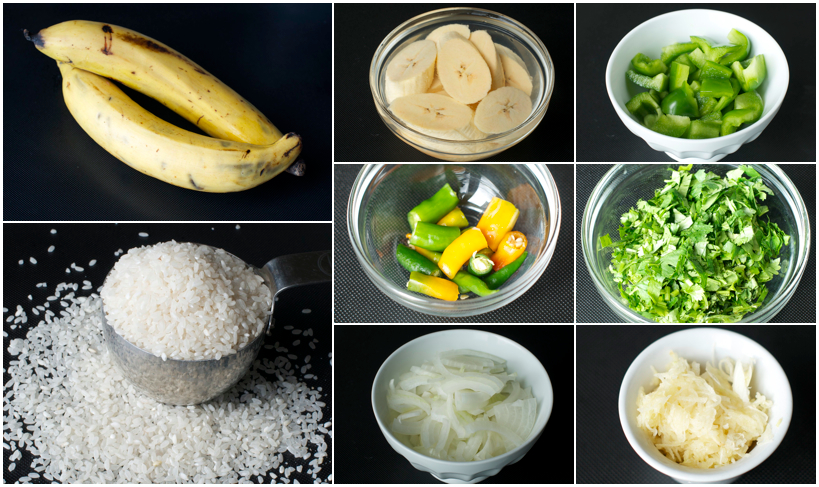
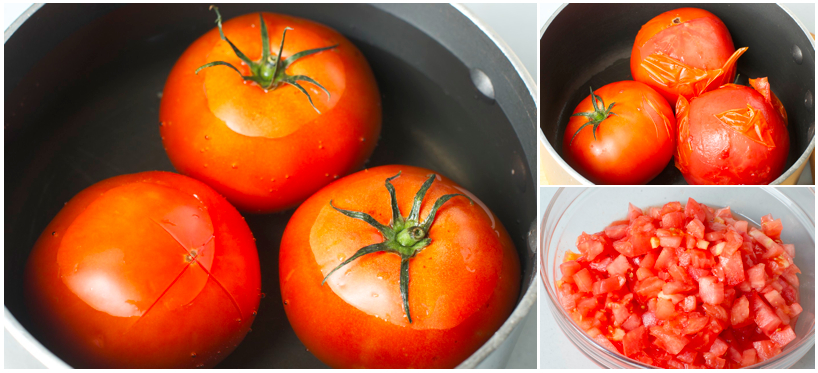

1. Using medium heat, fry the onions in the oil for 3 minutes, then add the garlic. 2. Add the Xawaash spice mix and turmeric powder. 3. Add the beef, the Vegeta seasoning and the ground black pepper. Cook for 4 minutes before adding the tomatoes. 4. Add the green chilli, if using. Add the tomatoes. 5. Add the hot water. 6. Cover and cook on medium heat for ½ hour. 7. Add the sliced plantain and the chopped green pepper. 8. Cover and cook on medium heat for another ½ hour. 9. Add the chopped coriander. It is ready to serve with rice (see recipe below), grits, anjero, or sabaayad.
1. Basasha dallac muddo 3 daqiiqo, kaddibna tuunta ku-dar. Hal daqiiqo isku-shiil. 2. Xawaashka iyo huruudda ku-dar. 3. Hilibka ku-rid digsiga. Maraq qudaarta Vegeta iyo filfisha shiidan ku-dar. Afar daqiiqo kari intaadan yaanyada ku-darin. 4. Basbaas cagaarka ku-dar (waa ka-dhaafi kartaa). Yaanyada ku-dar. 5. Biyaha kulul ku-dar. 6. Dabool oo dab dhexdhexaad ah ku-kari muddo ½ saac ah. 7. Moos bukiiniga iyo barbarooniga cagaaran ku-dar. 8. Dabool oo dab dhexdhexaad ah ku-kari muddo ½ saac ah. 9. Kabsaro caleenta jarjaran ku-dar oo dabka ka-dhemi. Waxaad ku-cuni kartaa bariis (soo’da hoos ayay ku-qoran tahay), soor, canjeero, ama sabaayad.
1. Frire les oignons dans l’huile 3 minutes à feu moyen, puis ajouter l’ail. 2. Ajouter le mélange d’épices Xawaash et la poudre de curcuma. 3. Ajouter le boeuf, le condiment Vegeta et le poivre noir moulu. Cuire 4 minutes avant d’ajouter les tomates. 4. Ajouter les piments si vous en utilisez. Ajouter les tomates. 5. Ajouter l’eau chaude. 6. Couvrir et cuire à feu moyen pendant ½ heure. 7. Ajouter le plantain tranché et le poivron vert découpé. 8. Couvrir et cuire à feu moyen 30 minutes de plus 9. Ajouter le coriandre haché. Le plat est prêt à être servi avec du riz (voir la recette ci-dessous), de la bouillie de maïs, anjero, ou sabaayad.

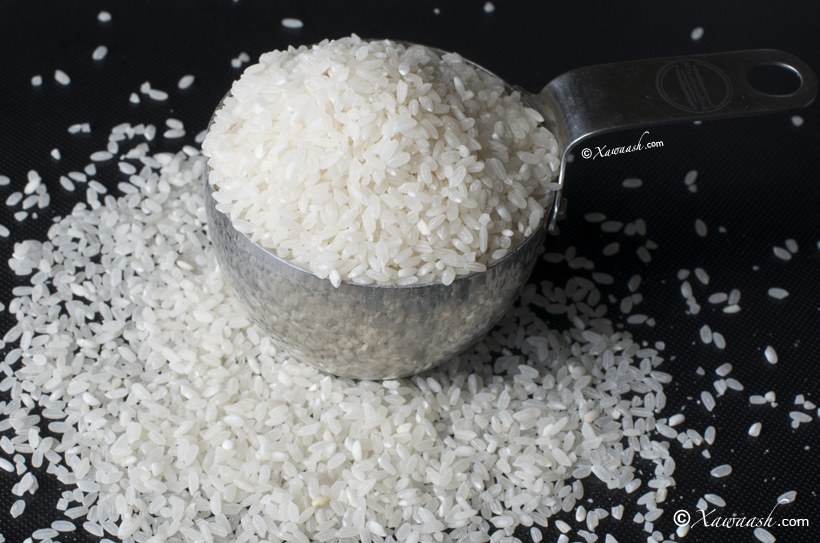
Rice
4 cups (948 mL) Water
2 tsp (10 mL) Vegeta seasoning or 1⅓ bouillon cubes (Maggi, Knorr etc.) or 1⅓ tsp salt
2 cups (400 g) Short grain rice (Calrose)
1 Tbsp (15 mL) Olive oil
Bariiska
4 koob (948 mL) Biyo
2 qy (10 mL) Maraq qudaar Vegeta ama 1⅓ mukacab (Maggi, Knorr, iwm.) ama 1⅓ qy cusbo
2 koob (400 g) Bariis kuuskuusan (Kaalroos ama bariis Masaari)
1 QW (15 mL) Saliidda oliifada
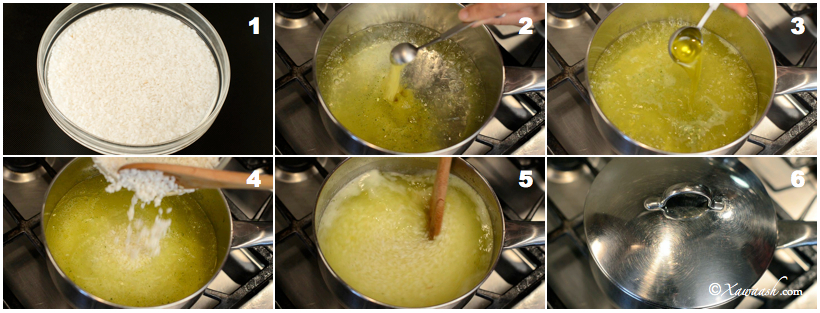
1. Wash the rice 3 times but do not soak. 2. Bring the water to a boil, then add the Vegeta seasoning. 3. Add the olive oil and mix well. 4. Add the rice. 5. When it comes to a boil, mix very well. 6. Cover and cook for 13 minutes using the lowest setting on your stove.
1. Bariiska 3 goor dhaq laakiin biyo hala-dhigin. 2. Markay biyaha karkaraan, ku-dar maraq qudaarta Vegeta. 3. Ku-dar saliidda oliifada, kaddibna si-fiican u-walaaq. 4. Bariiska ku-shub. 5. Marka uu soo karo, si-fiican u-walaaq. 6. Dabool oo dabka ugu gaaban ku-kari muddo 13 daqiiqo.
1. Laver le riz 3 fois sans le laisser tremper. 2. Faire bouillir l’eau, puis ajouter le condiment Vegeta. 3. Ajouter l’huile d’olive et bien mélanger. 4. Ajouter le riz. 5. Dès que l’ébullition reprend, bien touiller. 6. Couvrir et cuire 13 minutes au feu le plus bas possible.
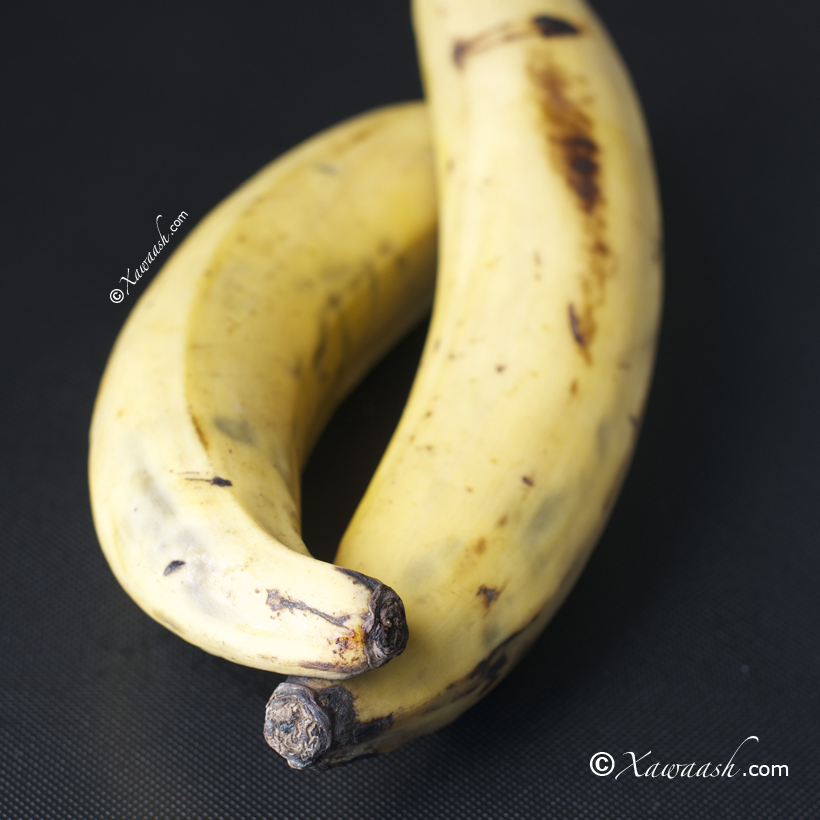

Fried Plantains
2 Ripe plantains
¼ tsp (1.25 mL) Vegeta seasoning
¼ tsp (1.25 mL) Xawaash
¼ cup (59 mL) Canola oil for frying
Moos Bukiini La-shiilay
2 Moos bukiini bisil
¼ qy (1.25 mL) Maraq qudaar Vegeta
¼ qy (1.25 mL) Xawaash
¼ koob (59 mL) Saliid caddeey oo lagu shiilo mooska
Plantains Frits
2 Plantains mûrs
¼ cc (1.25 mL) de Condiment Vegeta
¼ cc (1.25 mL) de Xawaash
¼ de mesure (59 mL) d’Huile de Colza pour la friture


1. Peel the ripe plantains. 2. Cut on a bias into ½” or 1¼ cm thickness. 3. The sliced plantains. 4. Add the Xawaash spice mix and the Vegeta seasoning. Coat well. 5. Using medium heat, fry the plantains in the oil. Fry for 2 minutes on the first side then flip over. 6. Fry for 1½ minutes on the second side. Drain on paper towels.
1. Moos bukiiniga fiiq. 2. U-jar gaballo buurnidooda tahay ½” ama 1¼ cm. 3. Moos bukiiniga oo jarjaran. 4. Ku-dar Xawaashka iyo maraq qudaarta Vegeta. Si-fiican u-wada mari. 5. Dab dhexdhexaad ah ku-shiil. Dhinaca koowaad 2 daqiiqo shiil, kaddibna dhanka kale u-rog. 6. Dhinaca labaad 1½ daqiiqo shiil. Xaanshiyaha jikada (paper towels) saliidda uga saar.
1. Peler les plantains mûrs. 2. Couper en biais des morceaux d’ ½ pouce ou 1,2 cm d’épaisseur. 3. Les plantains coupés. 4. Ajouter le Xawaash et le condiment Vegeta. Bien recouvrir. 5. Frire les plantains dans l’huile à feu moyen. Frire 2 minutes d’un côté puis retourner. 6. Frire 1½ minute de l’autre côté. Égoutter sur du papier absorbant.
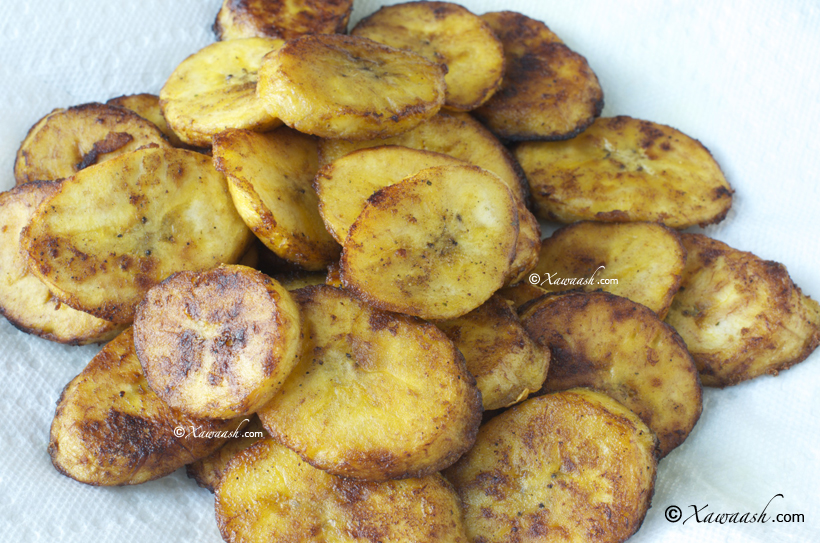

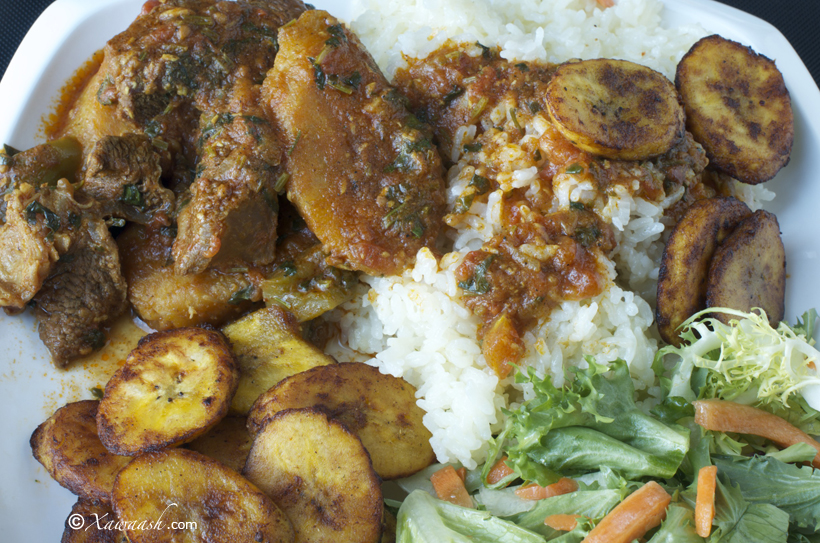
]]>

This flat bread is very popular as a breakfast item that is usually served during the Eid. It is similar to Anjero but it has additional ingredients that make it different. Ambabur has different spices added to the batter that give it a special taste. The types of spices added can vary from one region to the other. The spices most often added are: fennel seeds, cumin seeds, nigella seeds (black seeds), and turmeric powder. In addition to these, garlic and onion are also added.
Ambabur is very popular in Djibouti and could possibly be the place it originated. What we find interesting is the flavour combinations and the way it is served. Even though it has a savoury base, it is sprinkled with sugar and drizzled with melted ghee. The sweetened ambabur is then served with yogurt for a sweet and tangy combination.
In this recipe, we have used a combination of self-rising flour and instant dry yeast in order to speed up the fermentation process. This way, the fermentation time is reduced to 2 hours. Leftover batter can be stored in the fridge for a couple of days and when combined with a new batter, it will give the ambabur a nice sour taste.
Cette galette est très populaire comme aliment du petit déjeuner servi traditionnellement pendant l’Eid. Elle ressemble à l’Anjero mais elle a des ingrédients supplémentaires qui la rendent différente. On ajoute des épices différentes à la pâte de l’Ambabur qui lui donnent un goût spécial. Les épices ajoutées peuvent varier d’une région à l’autre. Les épices le plus souvent utilisées sont: graines de fenouil, graines de cumin, graines de nigelle (graines noires), et poudre de curcuma. En plus de celles-ci, on ajoute aussi de l’ail et de l’oignon.
L’Ambabur est très populaire à Djibouti qui pourrait être son pays d’origine. Ce que nous trouvons intéressant c’est le mélange des saveurs et la façon dont on sert la galette. Même si c’est un aliment salé à la base, il est assaisonné avec du sucre en poudre et du ghee fondu. L’Ambabur sucrée est servie accompagnée de yaourt pour former une combinaison sucrée et acidulée.
Dans cette recette, nous avons utilisé un mélange de farine avec levure incorporée et de levure instantanée pour accélérer le processus de fermentation. Comme ça, le temps de fermentation est réduit à 2 heures. La pâte qui reste peut être conservée au réfrigérateur pendant deux jours, puis ajoutée à une nouvelle pâte, elle donnera à l’ambabur un bon goût aigre.
Ingredients:
(Tbsp is a tablespoon; tsp is a teaspoon)
(1 cup = 237 mL = 2.4 dl; 1 Tbsp = 15 mL; 1 tsp = 5 mL); all are level measurements
Yields 16 Ambabur
½ tsp (2.5 mL) Fennel seeds
½ tsp (2.5 mL) Cumin seeds
½ tsp (2.5 mL) Nigella seeds (black seeds)
1 + 2 cups (710 mL) Water
½ cup (95 g) Coarse semolina
1 Garlic clove
¼ Onion
⅛ tsp (pinch) Turmeric powder
1 tsp (5 mL) Instant dry yeast
½ tsp (2.5 mL) Salt
1 Tbsp (30 mL) Granulated sugar
2 cups (280 g) Self-rising flour
Waxa loo baahan yahay:
(QW waa qaaddo weyn – midda cuntada lagu cuno; qy waa qaaddo yar)
(1 koob = 237 mL = 2.4 dl; 1 QW = 15 mL; 1 qy = 5 mL)
Waxaa laga sameyn karaa 16 cambaabur
½ qy (2.5 mL) Shoomar
½ qy (2.5 mL) Kaamuun (xawaash dhuudhuub)
½ qy (2.5 mL) Xabbad sooda
1 + 2 koob (710 mL) Biyo
½ koob (95 g) Sarreen aan aad loo shiishiid
1 Tuun (toon)
¼ Basal
⅛ qy (far iyo suul) Huruud shiidan
1 qy (5 mL) Qamiirka degdegga ah
½ qy (2.5 mL) Cusbo
1 QW (30 mL) Sokor
2 koob (280 g) Burka qamiirka leh
Ingrédients:
(cs est cuillère à soupe; cc est cuillère à café)
(1 mesure = 237 mL; 1 cs = 15 mL; 1 cc = 5 mL) mesures à ras
Pour 16 Ambabur
½ cc (2.5 mL) de Graines de Fenouil
½ cc (2.5 mL) de Graines de Cumin
½ cc (2.5 mL) de Graines de Nigelle (graines noires)
1+2 mesures (710 mL) d’Eau
½ mesure (95 g) de Semoule Gros Grain
1 Gousse d’Ail
¼ d’Oignon
⅛ cc (une pincée) de Curcuma en Poudre
1 cc (5 mL) de Levure Instantanée
½ cc (2.5 mL) de Sel
1 cs (30 mL) de Sucre en Poudre
2 Mesures (280 g) de Farine avec Levure Instantanée
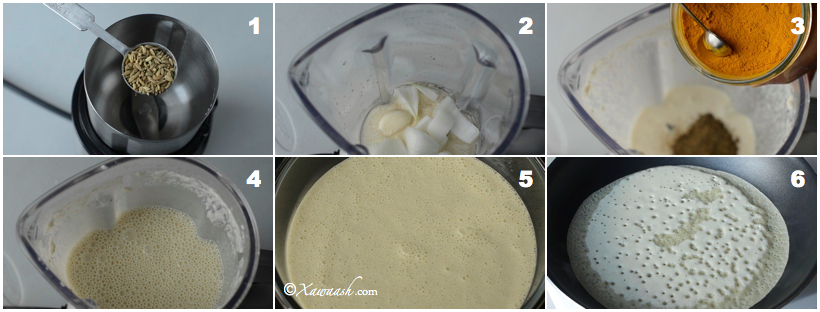
1. In a grinder, combine the fennel, cumin, and nigella (black) seeds. Grind well. 2. In a blender, combine 1 cup water, semolina, garlic, and onion. Blend well. 3. Add the rest of the ingredients. 4. Blend well. 5. Let the batter ferment for 2 hours or more. 6. Scoop enough batter, depending on the size of the pan you are using, and cook until the batter dries up in the pan.
1. Waxaa isku shiiddaa shoomarka, kaamuunta, iyo xabbad soodada. 2. Khallaadka waxaa ku-shubtaa koob biyo ah iyo sarreenka, kaddibna ku-rid toonta iyo basasha. Si-fiican u-shiid. 3. Maqaaddiirta kale ku kor dar. 4. Si-fiican u-shiid. 5. Cajiinka dhig muddo 2 saacadood ama ka-badan . 6. Cajiinka inta aad soo dareysid wuxuu ku-xiran yahay birta aad isticmaaleysid cabbirkeeda. Haddaadan rabin inuu cambaaburka dhinacyada ka-qalalo, cajiinka birta dhinacyadeeda ha gaarsiinin.
1. Dans un moulin, mélanger le fenouil, le cumin, et les graines de nigelle (noire). Bien moudre. 2. Dans un blender, mélanger 1 mesure d’eau, la semoule, l’ail, l’oignon. Bien mixer. 3. Ajouter le reste des ingrédients. 4. Bien mixer. 5. Laisser fermenter la pâte pendant 2 heures ou plus. 6. Prélever une quantité de pâte suffisante pour remplir la poêle (suivant sa taille). Cuire jusqu’à ce que la pâte soit sèche.


]]>

Long before we were introduced to the doughnuts we had outside Somalia, we were familiar with kac kac. We loved these tasty snacks that were sold in traditional Somali restaurants (maqaayo Soomaali) in Mogadishu. They were great for a quick breakfast when served alongside a cup of Somali tea with milk (shaah caddeeys). In those restaurants, they would prepare a big pile of kac kac early in the morning and by noon they would vanish.
In addition to kac kac, for breakfast, these restaurants served anjero, qamdi, bur saliid, mashmash, sambuus (samosas), beer & basal (liver & onions), suqaar, and kabaab (meatballs). All were freshly prepared on the premises except for the anjero and mashmash, which were delivered to them very early in the morning.
By social convention, those eateries catered to men only and were off-limits to women. However, women could buy for take-out and that they did. Luckily, that social convention did not hold in the diaspora where more and more Somali women frequent Somali eateries.
Kac kac were also prepared in some homes but they were usually made for sale. Preparing sweets and selling them provided a source of income to those who were in possession of family recipes that were passed down through generations. It was a lifeline for some families, thereby the reluctance to share those treasured recipes which were regarded as closely guarded secrets. Nowadays, some are still reluctant to share recipes in the hopes of one day starting a restaurant.
Longtemps avant que nous goûtions aux donuts en dehors de la Somalie, nous étions habitués aux kac kac. Nous adorions ces snacks goûteux qui étaient vendus dans les restaurants Somalis traditionnels (maqaayo Soomaali) à Mogadishu. Servis avec une tasse de thé au lait (shaah caddeeys), ils étaient très bien pour un petit-déjeuner rapide. Ces restaurants préparaient une grosse pile de kac kac tôt le matin et à midi ils étaient partis.
En plus du kac kac, pour le petit-déjeuner, ces restaurants servaient de l’anjero, qamdi, bur saliid, mashmash, sambuus (samosas), beer & basal (foie aux oignons), suqaar, et kabaab (boulettes de viande). Tous ces plats étaient préparés sur place sauf l’anjero et le mashmash, qui étaient livrés très tôt le matin.
Les conventions sociales voulaient que ces restaurants servent uniquement les hommes et étaient interdits aux femmes. Toutefois, les femmes pouvaient acheter à emporter et c’est ce qu’elles faisaient. Heureusement, ces conventions sociales n’ont pas tenu dans la diaspora où de plus en plus les femmes Somali fréquentent les restaurants Somali.
Les Kac kac étaient aussi préparés dans certaines maisons mais ils étaient destinés à la vente. Préparer les friandises et les vendre était une source de revenus pour ceux qui étaient en possession de recettes de famille qui se transmettaient de génération en génération. C’était un moyen de survie pour ces familles, d’où leur réticence à partager ces précieuses recettes qui avaient le statut de secrets bien gardés. De nos jours, certains sont toujours réticents à partager leurs recettes dans l’espoir d’un jour ouvrir un restaurant.

Ingredients:
(Tbsp is a tablespoon; tsp is a teaspoon)
(1 cup = 237 mL = 2.4 dl; 1 Tbsp = 15 mL; 1 tsp = 5 mL); all are level measurements
Yields 24 doughnuts
2 cups (280 g) All-purpose flour
½ cup (100 g) Granulated sugar
1 tsp (5 mL = 0.05 dl) Baking powder
2 Large eggs
½ cup (125 mL = 1.3 dl) Unsalted melted butter (very warm)
2 Tbsp (30 mL = 0.3 dl) Milk (warm)
For frying:
Canola oil or any other flavourless oil
Waxa loo baahan yahay:
(QW waa qaaddo weyn – midda cuntada lagu cuno; qy waa qaaddo yar)
(1 koob = 237 mL = 2.4 dl; 1 QW = 15 mL; 1 qy = 5 mL)
Waxaa laga sameyn karaa 24 kac kac
2 koob (280 g) Bur cad
½ koob (100 g) Sokor
1 tsp (5 mL = 0.05 dl) Qamiir “Baking powder”
2 Ukun waaweyn
½ koob (125 mL = 1.3 dl) Buuro aan cusbo lahayn (xoogaa kulul)
2 QW (30 mL = 0.3 dl) Caano (xoogaa kulul)
Waxaa ku shiishaa:
Saliid caddeey
Ingrédients:
(cs est cuillère à soupe; cc est cuillère à café)
(1 mesure = 237 mL; 1 cs = 15 mL; 1 cc = 5 mL) mesures à ras
Pour 24 Beignets
2 mesures (280 g) de Farine Blanche
½ mesure (100 g) de Sucre en Poudre
1 cc (5 mL) de Levure Chimique
2 Gros Oeufs
½ mesure (125 mL) de Beurre Doux fondu (bien chaud)
2 cs (30 mL) de Lait (chaud)
Pour la friture:
Huile de Colza ou tout huile sans saveur
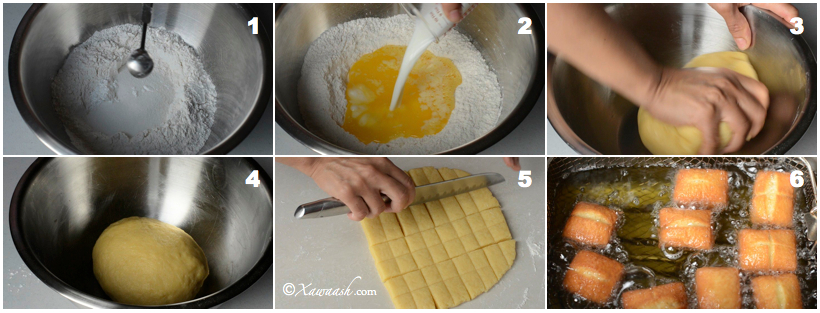
1. Combine the dry ingredients: flour, sugar, and baking powder. Mix well. 2. Add all the wet ingredients: eggs, butter, and milk. Mix well. 3. Knead well for 3 minutes. 4. Let the dough rest for 10 minutes. 5. Roll out the dough to ¼ inch (½ cm) thick. Cut into 24 pieces, then mark the surface by pressing a knife lightly on the dough (see video). 6. Fry in canola oil (or any other flavourless oil) at 375°F/190°C for 3 to 4 minutes until golden brown. Use medium heat.
1. Isku-qas burka, sokorta, iyo qamiirka “baking powder.” 2. Ku-dar ukunta, buurada, iyo caanaha. Si-fiican isku-qas. 3. Cajiinka si-fiican u-rifaaq (u-xash) muddo 3 daqiiqo ah. 4. Dhig muddo 10 daqiiqo ah. 5. Cajiinka u-fidi buurni ¼” (½ cm). U-jar 24 gabal, kaddibna ku-xarriiq middida (daawo fiidiyaha). Isla markii shiil. 6. Waxaa ku-shiishaa saliid caddeey kuleylkeeda yahay 350°F/190°C muddo 3 ilaa 4 daqiiqo ilaa ay ka-gaduutaan. Waxaa isticmaashaa dab dhexdhexaad ah.
1. Mélanger les ingrédients secs: farine, sucre, et levure chimique. Bien mélanger. 2. Ajouter les ingrédients liquides: oeufs, beurre, et lait. Bien mélanger. 3. Pétrir pendant 3 minutes. 4. Laisser reposer la pâte pendant 10 minutes. 5. Étaler la pâte sur ¼ de pouce (1/2 cm) d’épaisseur. Couper 24 morceaux, puis marquer la surface en appuyant doucement avec un couteau (voir la vidéo). 6. Faire frire dans l’huile de colza (ou autre huile sans saveur) à 375°F/190°C pendant 3 à 4 minutes jusqu’à ce les beignets soient dorés. Utiliser un feu moyen.
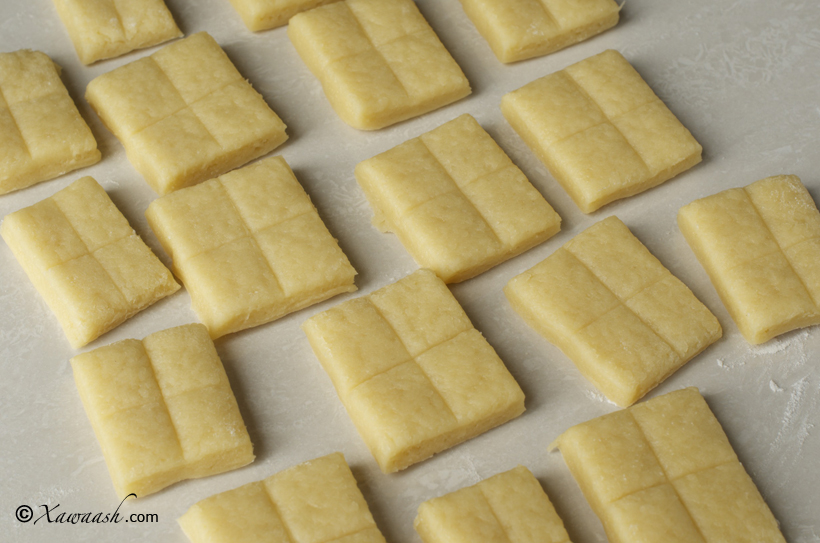




Served with Somali tea with milk
Kac kac iyo shaah caddeys
Servis avec du thé au lait Somali

Served with Somali tea with milk
Kac kac iyo shaah caddeys
Servis avec du thé au lait Somali
]]>

Icun icalaanji caloosha iggee (iggeli)
Are you getting ready for Eid? What would Eid be without icun? We mean the icun of “icun icalaanji caloosha iggee (iggeli)” fame. That is what the street vendors selling icun used to say and it means “eat me, chew me, and dispatch me to the stomach.” We do not know where the “chew me” part came from because these delicate cookies offer very little resistance and just melt in your mouth.
We remember these delicious cookies from our childhood. They had a red dot on top that made them look very pretty. Good icun should be light and crumbly and their colour should also be very light. Made of only flour, sugar, and butter, basic icun is very simple to make once you master the right proportions of the ingredients.
We have our Eid rituals. The preparations for Eid are just as exciting as the big day and one of the things that we do is that we always bake some goodies the night before. The smell of a freshly baked cake or cookies helps put everyone in the mood. The baking happens in between phone calls and it is quite a challenge since the phone never stops ringing. Relatives and friends from different parts of the world would call offering their Eid wishes well into the night. And we love it.
Êtes-vous en pleine préparation de l’Eid? Que serait l’Eid sans icun? L’icun du très connu “icun icalaanji caloosha iggee (iggeli)”. C’est ce que les vendeurs de rue d’icun disaient, cela veut dire: Mange-moi, mâche-moi, et expédie-moi dans ton estomac”. Nous ne savons pas pourquoi ils disaient “mâche-moi” parce que ces gâteaux délicats n’offrent aucune résistance, ils vous fondent dans la bouche.
Nous nous rappelons que ces gâteaux délicieux faisaient partie de notre enfance. Ils avaient un point rouge sur le dessus qui les rendaient jolis. Un bon icun devrait être léger et très friable. Fait avec seulement de la farine, du sucre, et du beurre, le icun basique est très simple à faire une fois que vous maîtrisez les bonnes proportions d’ingrédients.
Nous avons nos rituels de l’Eid. Les préparations de l’Eid sont tout aussi excitantes que le grand jour et une des choses que nous faisons est que nous cuisons toujours des friandises la nuit d’avant. L’odeur d’un gâteau ou de biscuits tout juste sortis du four aide à mettre tout le monde de bonne humeur. La cuisson se passe entre les coups de fil et c’est tout un challenge car le téléphone n’arrête pas de sonner. Famille et amis nous appellent de différents parties du monde toute la nuit pour nous offrir leurs voeux de l’Eid. Et nous apprécions ça.
Ingredients:
(Tbsp is a tablespoon; tsp is a teaspoon)
(1 cup = 237 mL = 2.4 dl; 1 Tbsp = 15 mL; 1 tsp = 5 mL); all are level measurements
Yields 75 cookies
Plain shortbread cookies:
1 cup (250 mL = 2.5 dl) Unsalted butter
⅔ cup (106 g) Powdered sugar
2 cups (280 g) All-purpose flour
¼ tsp (1.25 g) Ground cardamom
Shortbread cookies with almonds:
1 cup (250 mL = 2.5 dl) Unsalted butter
⅔ cup (106 g) Powdered sugar
2 cups (280 g) All-purpose flour
½ cup (50 g) Ground almonds
1½ tsp (8 g) Vanillin sugar
For decorating:
Use one of the following: Glace cherries/currants/cloves/food colouring
Waxa loo baahan yahay:
(QW waa qaaddo weyn – midda cuntada lagu cuno; qy waa qaaddo yar)
(1 koob = 237 mL = 2.4 dl; 1 QW = 15 mL; 1 qy = 5 mL)
Waxaa laga sameyn karaa 75 icun
Waxaan sameynay 2 nooc oo icun, mid aan loos lahayn iyo mid leh.
Icun aan loos lagu darin:
1 koob (250 mL = 2.5 dl) Buuro cusbo lahayn qabowga ka-dhacay
⅔ koob (106 g) Sokor shiidan
2 koob (280 g) Bur cad
¼ qy (1.25 g) Heyl shiidan
Icun loos lagu sameeyay:
1 koob (250 mL = 2.5 dl) Buuro cusbo lahayn qabowga ka-dhacay
⅔ koob (106 g) Sokor shiidan
2 koob (280 g) Bur cad
½ koob (50 g) Loos shiidan
1½ qy (8 g) Sokor fanilla leh
Qurxiska:
Kuwaan mid ka-mid ah isticmaal: Jilyeejo sokor leh/sabiib aad u-yaryar/dhegayare/midabka cuntada lagu daro
Ingrédients:
(cs est cuillère à soupe; cc est cuillère à café)
(1 mesure = 237 mL; 1 cs = 15 mL; 1 cc = 5 mL) mesures à ras
Pour 75 biscuits
Biscuits Sablés nature:
1 mesure (250 mL) de Beurre Doux
⅔ de mesure (106 g) de Sucre en Poudre
2 mesures (280 g) de Farine Blanche
¼ cc (1.25 g) de Cardamome Moulue
Biscuits Sablés aux amandes:
1 mesure (250 mL) de Beurre Doux
⅔ de mesure (106 g) de Sucre en Poudre
2 mesures (280 g) de Farine Blanche
½ mesure (50 g) de Poudre d’Amandes
1½ cc (8 g) de Sucre Vanilline
Pour la Décoration:
Utiliser un des suivants: Cerises Confites/Raisins de Corinthe (raisins secs)/Clous de girofle/ Colorant Alimentaire

1. Place the butter in the bowl of a mixer. 2. Add the powdered sugar. 3. Beat for 7 minutes until the colour of the mixture becomes very light. 4. Add the flour. 5. Add the ground almonds, if using. 6. Add the vanillin sugar. 7. Or add the ground cardamom. 8. Mix for 3 minutes. 9. Refrigerate the dough for 1 hour.
1. Buurada ku-rid baaquliga makiinadda. 2. Sokorta shiidan ku-dar. 3. Si-fiican u-garaac muddo 7 daqiiqo ilaa uu midabka ka-caddaado. 4. Burka ku-dar. 5. Haddii aad sameynaysid nooca looska leh, hadda ku-dar looska shiidan. 6. Ku-dar sokorta fanillada leh. 7. Ama waxaa ku-dartaa heyl shiidan. 8. Isku-qas muddo 3 daqiiqo ah. 9. Cajiinka qaboojiyaha geli muddo 1 saac ah.
1. Mettre le beurre dans le bol du mixer. 2. Ajouter le sucre en poudre. 3. Battre pendant 7 minutes jusqu’à ce que la couleur du mélange devienne très claire. 4. Ajouter la farine. 5. Ajouter la poudre d’amandes, si utilisée. 6. Ajouter le sucre vanilline. 7. Ou ajouter la cardamome moulue. 8. Mélanger pendant 3 minutes. 9. Réfrigérer la pâte pendant 1 heure.

Nooca labaad ee icunka wuxuu leeyahay loos shiidan iyo sokor fanilla leh

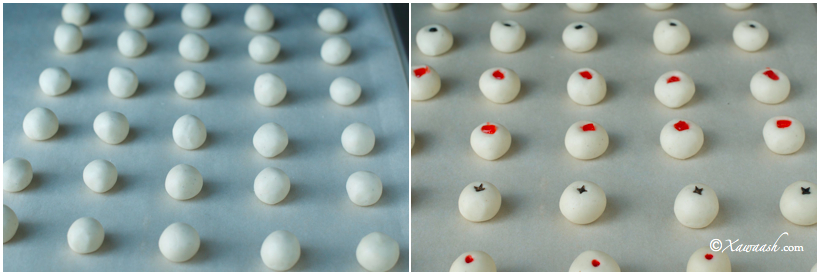
Bake in a preheated oven at 350°F/177°C for 18 to 20 minutes
Waxaa ku-dubtaa foorno la-sii kululeeyay 350°F/177°C muddo 18 ilaa 20 daqiiqo
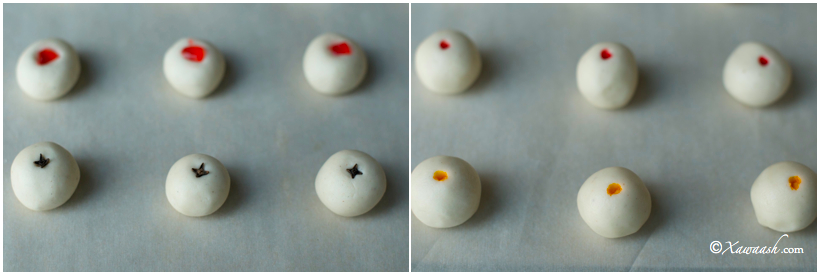



]]>

East African curries are influenced by Indian as well as Middle Eastern cuisines, so any similarities are not coincidental. This curry contains coconut milk which features prominently in Swahili cooking and it is one of the ingredients that makes the food really delicious.
This recipe is a family favourite and is one of the dishes most often requested when our nephews and nieces come for a visit. Even though the list of ingredients is quite long, most of the ingredients are items we regularly stock in our pantry. Traditionally, the chicken is cooked separately and is added to the pot in the last ten minutes or so of cooking. In order to simplify the dish, we cooked everything in one pot.
For this dish, we prefer using chicken thighs instead of chicken breast. The dark meat stays moist and tender for a longer period while it becomes infused with all the flavours of the curry.
Les currys d’Afrique de l’Est sont influencés par la cuisine Indienne ainsi que les cuisines du Moyen Orient, ils présentent donc des similarités. Ce curry contient du lait de coco qui est très présent dans la gastronomie Swahili et qui est aussi un des ingrédients qui rendent la nourriture vraiment délicieuse.
Cette recette est une des favorites de la famille et un des plats les plus demandés par nos neveux et nièces lorsqu’ils viennent nous visiter. Bien que la liste des ingrédients soit longue, la plupart sont des ingrédients souvent présents dans notre garde-manger. Traditionnellement, le poulet est cuit séparément puis ajouté à la marmite pour les dix dernières minutes de cuisson. Pour simplifier le plat, nous avons tout cuit dans un seul récipient.
Pour ce plat, nous préférons utiliser des cuisses de poulet plutôt que des escalopes. La viande brune reste juteuse et tendre pendant plus longtemps pendant qu’elle infuse dans les saveurs du curry.
Ingredients:
(Tbsp is a tablespoon; tsp is a teaspoon)
(1 cup = 237 mL; 1 Tbsp = 15 mL; 1 tsp = 5 mL) all level measurements
(1 Tbsp Vegeta Seasoning Mix (18 g) = 2 Maggi or Knorr bouillon cubes = 2 tsp salt)
Serves 8
½ cup (118 mL) Canola oil
2 Onions
2 Large garlic cloves (or 3 small)
1 Tbsp (15 mL) Fresh ginger
1 Tbsp (15 mL) Cumin Powder
1 Tbsp (15 mL) Curry powder
1 tsp (5 mL) Turmeric powder
¼ tsp (2.5 mL) Cardamom powder
1 Tbsp (15 mL) Vegeta seasoning or 2 bouillon cubes (Maggi, Knorr etc.) or 2 tsp (12 g) salt
5 Tomatoes
2 Jalapeno peppers (or to taste) – Remove the seeds if you do not like it very spicy
1 cup (237 mL) Plain yogurt
2 Tbsp (30 mL) Tomato paste
1 Potato
1 Carrot
1 Sweet red pepper
2 lb (900 g) Boneless, skinless chicken thighs (cubed)
1 can (398 mL) Coconut milk
1 Tbsp (15 mL) Brown sugar (packed)
3 Tbsp (45 mL) Butter or ghee (optional)
1 cup (237 mL) Cilantro (chopped)
Waxa loo baahan yahay:
(QW waa qaaddo weyn – midda cuntada lagu cuno; qy waa qaaddo yar)
(1 koob = 237 mL; 1 QW = 15 mL; 1 qy = 5 mL)
(1 QW “Vegeta Seasoning Mix” = 2 mukacab Maggi ama Knorr = 2 qy cusbo)
Ku-filan 6 qofood
½ koob (118 mL) Saliid caddeey
2 Basal
2 Tuun (toon) waaweyn ama 3 yaryar
1 QW (15 mL) Sanjabiil cusboon (fresh)
1 QW (15 mL) Kaamuun shiidan
1 QW (15 mL) Kaari shiidan (curry powder)
1 qy (5 mL) Huruud shiidan
¼ qy (2.5 mL) Hayl shiidan
1 QW (15 mL) Maraq qudaar Vegeta ama 2 mukacab Maggi, Knorr ama 2 qy (12 g) cusbo
5 Yaanyo
2 Basbaas halabeenyo (jalapeno) – Miraha ka-saar haddaadan kuleyl badan jeclayn
1 koob (237 mL) Caano fadhi ama garoor
2 QW (30 mL) Yaanyo shiishiid
1 Bataato (baradho)
1 Karooto
1 Barbarooni gaduudan
2 lb (900 g) Cajarro digaag aan lafo lahayn
1 koob (398 mL) Caano qumbe
1 QW (15 mL) Sokorta madoow (faraha ku-riix markaad cabbiraysid)
3 QW (45 mL) Buuro ama subag (waad ka-dhaafi kartaa)
1 koob (237 mL) Kabsaro caleen
Ingrédients:
(cs est cuillère à soupe; cc est cuillère à café)
(1 mesure = 237 mL; 1 cs = 15 mL; 1 cc = 5 mL) mesures à ras
(1 cs de Mélange Assaisonnement Vegeta (18 g) = 2 bouillon cubes Maggi ou Knorr = 2 cc de sel)
Pour 8
½ mesure (118 mL) d’Huile de Colza
2 Oignons
2 Grosses Gousses d’Ail (ou 3 petites)
1 cs (15 mL) de Gingembre Frais
1 cs (15 mL) de Cumin en Poudre
1 cs (15 mL) de Curry en Poudre
1 cc (5 mL) de Poudre de Curcuma
¼ cc (2.5 mL) de Cardamome en Poudre
1 cs (15 mL) d’assaisonnement Vegeta ou 2 bouillon cubes (Maggi, Knorr etc.) ou
2 cs (12 g) de Sel
5 Tomates
2 Piments Jalapeno (ou selon le goût) – Retirer les pépins si vous n’aimez pas trop épicé
1 Mesure (237 mL) de Yaourt Nature
2 cs (30 mL) de Concentré de Tomate
1 Pomme de Terre
1 Poivron Rouge
2 Livres (900 g) de Cuisses de Poulet sans la peau, désossées, coupées en cubes
1 Boite (398 mL) de Lait de Coco
1 cs (15 mL) de Sucre Roux
3 cs (45 mL) de Beurre ou de Ghee (optionnel)
1 Mesure (237 mL) de Coriandre (haché)
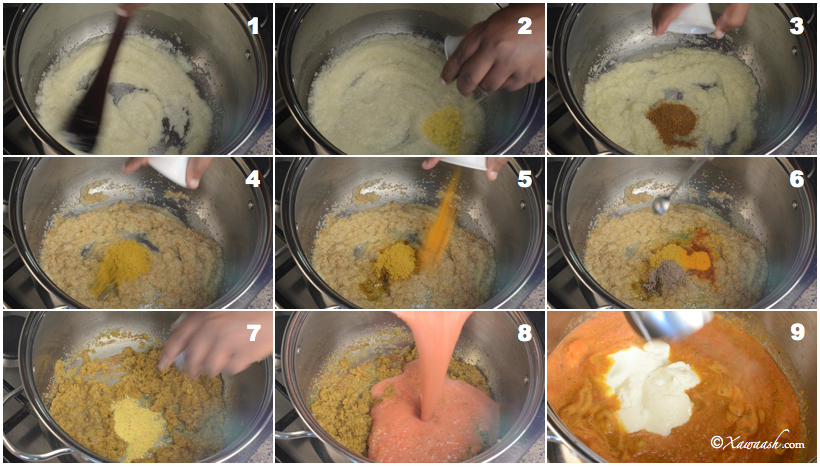
1. Blend the onions and garlic, then saute in the oil for 5 minutes. 2. Grate the ginger, then add. 3. Add the cumin powder. 4. Add the curry powder. 5. Add the turmeric powder. 6. Add the cardamom powder. 7. Add the Vegeta or bouillon cubes. 8. Blend the tomatoes and jalapeno, then add them to the pot. 9. Add the yogurt then cover and cook on medium heat for 10 minutes.
1. Basasha iyo tuunta isku-shiid. Saliidda ku-dallac muddo 5 daqiiqo. 2. Sanjabiisha xoq oo ku-dar. 3. Kaamuunta ku-dar. 4. Kaariga ku-dar. 5. Huruudda ku-dar. 6. Haylka ku-dar. 7. Ku-dar maraq qudaarta Vegeta ama mukacbaadka Maggi/Knorr. 8. Yaanyada iyo basbaaska isku-shiid, kaddibna ku-dar. 9. Caano fadhiga ku-dar, kaddibna dabool oo dab dhexdhexaad ah ku-kari muddo 10 daqiiqo.
1. Mixer les oignons et l’ail, puis les faire revenir dans l’huile pendant 5 minutes. 2. Râper le gingembre, puis ajouter. 3. Ajouter le cumin en poudre. 4. Ajouter le curry en poudre. 5. Ajouter le curcuma en poudre. 6. Ajouter la cardamome en poudre. 7. ajouter le Vegeta ou les bouillons cubes. 8. Mixer les Tomates et le piment, puis ajouter au plat. 9. Ajouter le yaourt, couvrir puis cuire à feu moyen pendant 10 minutes.
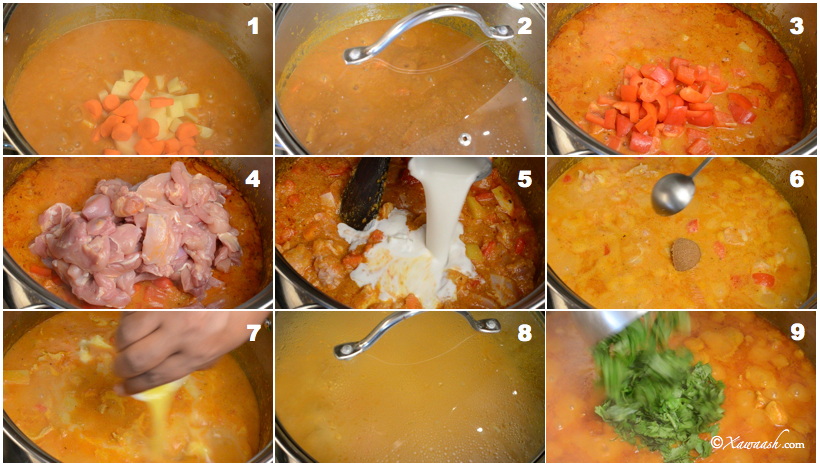
1. Add the potato and carrot. 2. Cover and cook on medium heat for 30 minutes. 3. Add the sweet pepper. 4. Add the chicken. 5. Add the coconut milk. 6. Add the brown sugar. 7. Add the butter or ghee (if using). 8. Cover and cook on medium heat for 30 minutes. 9. Add the chopped cilantro. Serve with white rice.
1. Bataatada (baradhada) iyo karootada ku-dar. 2. Dabool oo dab dhexdhexaad ah ku-kari muddo 30 daqiiqo. 3. Barbarooniga ku-dar. 4. Digaagga ku-dar. 5. Caanaha qumbaha ku-dar. 6. Sokorta madoow ku-dar. 7. Buurada ama subagga ku-dar (haddaad isticmaaleysid). 8. Dabool oo dab dhexdhexaad ah ku-kari muddo 30 daqiiqo. 9. Kabsaro caleenta ku-dar. Bariid cad ku-cun.
1. Ajouter la pomme de terre et la carotte. 2. Couvrir et cuire à feu moyen pendant 30 minutes. 3. Ajouter le poivron. 4. Ajouter le poulet. 5. Ajouter le lait de coco. 6. Ajouter le sucre roux. 7. Ajouter le beurre ou le ghee (si vous en utilisez). 8. Couvrir et cuire à feu moyen pendant 30 minutes. 9. Ajouter le coriandre haché. Servir avec du riz blanc.
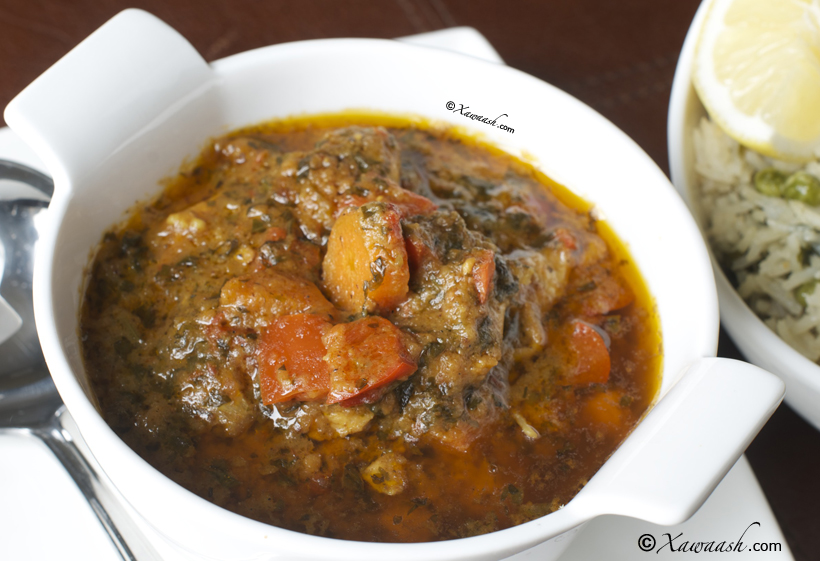
Best served with plain white rice or the Cilantro Rice
Maraqa wuxuu ku-fiican yahay bariis cad ama Bariis Kabsaro Leh
Meilleur servi avec du riz blanc ou du Riz au Coriandre
]]>
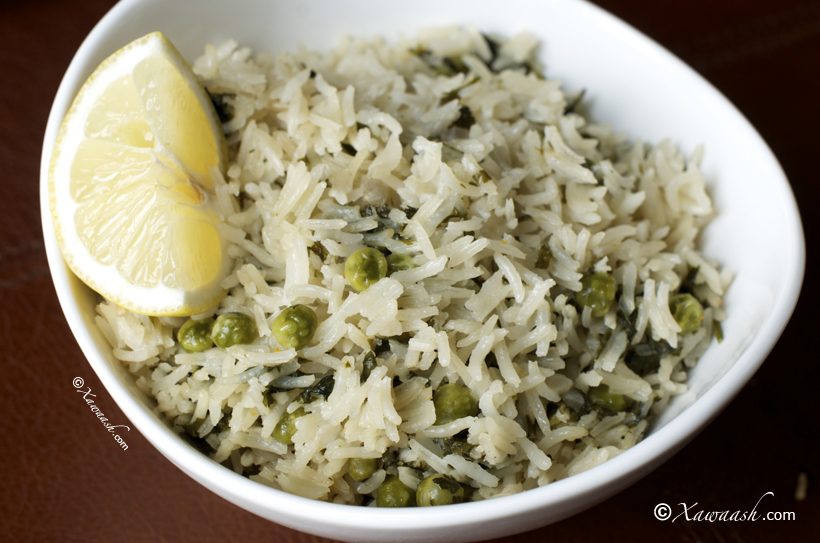
We hear a lot about teamwork in the workplace but little about teamwork at home. We believe it is just as important if not more. We like to cook together, prepare recipes together, as well as taking turns to cook. Apart from the benefit it has of building a stronger relationship and fostering companionship with one another, it is a great way to teach our boys about gender equality. What is better than teaching by example?
We have decided that in the video accompanying this post as well as future ones, we will take turns cooking, to better reflect the situation in our home. We hope that it will encourage more men to get in the kitchen. This is particularly important for Somali youth who need to learn to overcome the cultural bias that discourages them from helping in the kitchen.
We would also like our sisters to understand that it takes time to change these deep-rooted attitudes. We need patience as we slowly move towards a more egalitarian society.
On entend souvent parler de travail d’équipe au travail mais plus rarement du travail d’équipe à la maison. Nous croyons qu’il est tout aussi important sinon plus. Nous aimons cuisiner ensemble, préparer des recettes ensemble, mais aussi cuisiner chacun notre tour. En plus de l’avantage de construire une relation plus solide et d’apprécier la compagnie de chacun, c’est aussi un bon moyen d’apprendre à nos garçons l’égalité des sexes. Quel meilleur moyen que d’enseigner par l’exemple?
Nous avons décidé que dans la vidéo qui accompagne notre post ainsi que pour les suivantes, nous allons cuisiner chacun notre tour, pour mieux refléter la situation dans notre foyer. Nous espérons que cela encouragera plus d’hommes à se mettre à la cuisine. C’est particulièrement important pour les jeunes Somalis qui ont besoin de dépasser les préjugés culturels qui les découragent d’aider en cuisine.
Nous aimerions aussi que nos soeurs sachent qu’il faut du temps pour changer ces vieilles habitudes. Nous avons besoin de patience pendant que nous évoluons doucement vers une société plus égalitaire.
Ingredients:
(Tbsp is a tablespoon; tsp is a teaspoon)
(1 cup = 237 mL; 1 Tbsp = 15 mL; 1 tsp = 5 mL) all level measurements
(1 Tbsp Vegeta Seasoning Mix (18 g) = 2 Maggi or Knorr bouillon cubes = 2 tsp salt)
Serves 6
2 Tbsp (30 mL) Canola or vegetable oil
1 cup (150 g) Onions (fine chopped)
2 cups (400 g) Basmati rice (not soaked)
2½ cups Hot water
1 can (398 mL) Coconut milk
2 tsp (10 mL) Vegeta seasoning or 1⅓ bouillon cubes (Maggi, Knorr etc.) or 1⅓ tsp (9 g) salt
½ cup (70 g) Peas (fresh or frozen)
1 cup (237 mL) Cilantro (chopped)
Waxa loo baahan yahay:
(QW waa qaaddo weyn – midda cuntada lagu cuno; qy waa qaaddo yar)
(1 koob = 237 mL; 1 QW = 15 mL; 1 qy = 5 mL)
(1 QW “Vegeta Seasoning Mix” = 2 mukacab Maggi ama Knorr = 2 qy cusbo)
Ku-filan 6 qofood
1 koob (150 g) Basal (aad loo yaryareeyay)
2 koob (400 g) Bariis basmati (aan biyo lala dhigin)
2½ koob Biyo kulul
1 gasac (398 mL) Caano qumbe
2 qy (10 mL) Maraq qudaar Vegeta ama 1⅓ makacab Maggi/Knorr ama 1⅓ qy (9 g) cusbo
½ koob (70 g) Biseeli (cusboon ama baraf ah)
1 koob (237 mL) Kabsaro caleen la-jarjaray
Ingrédients:
(cs est cuillère à soupe; cc est cuillère à café)
(1 mesure = 237 mL; 1 cs = 15 mL; 1 cc = 5 mL) mesures à ras
(1 cs de mélange d’Assaisonnement Vegeta (18 g) = 2 bouillon cubes Maggi ou Knorr = 2 cc de sel)
Pour 6
2 cs (30 mL) d’Huile de Colza ou Végétale
1 mesure (150 g) d’Oignons (emincés fin)
2 mesures (400 g) de Riz Basmati (non trempé)
2½ mesures d’Eau Chaude
1 Boite (398 mL) de Lait de Coco
2 cc (10 mL) d’Assaisonnement Vegeta ou 1⅓ bouillon cube (Maggi, Knorr etc) ou
1⅓ cc (9 g) de Sel
½ mesure (70 g) de Petits Pois (frais ou surgelés)
1 mesure (237 mL) de Coriandre (haché)

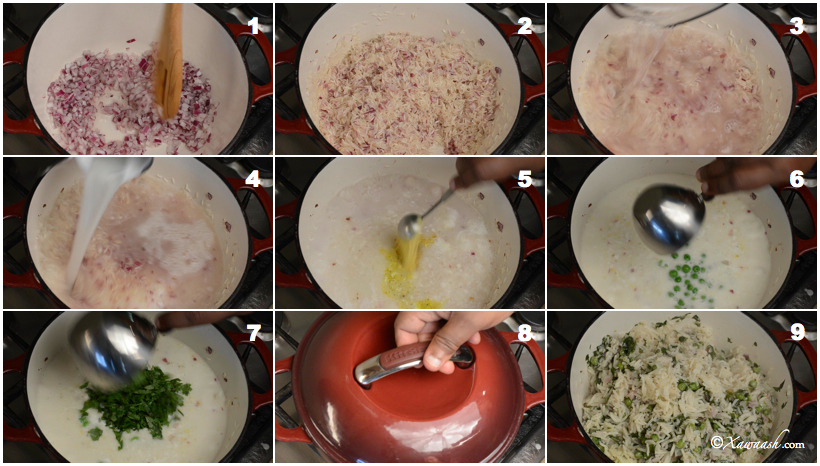
1. On medium heat, saute the onions in the canola oil for 3 minutes. 2. Add the rice and cook for 2 minutes. 3. Add the hot water. 4. Add the coconut milk. 5. Add the Vegeta, or bouillon cubes, or salt and stir well. 6. Add the peas. 7. Add the chopped cilantro. 8. When it comes to a boil, set the heat to very low. Cover and cook for 15 minutes and do not lift the lid. 9. After the 15 minutes have elapsed, turn off the heat and let the rice rest for 10 minutes before serving.
1. Digsi dab dhexdhexaad ah saaran, ku-shub saliidda waxaana ku-dallacdaa basasha muddo 3 daqiiqo ah. 2. Bariiska ku-shub oo 2 daqiiqo kari. 3. Biyaha kulul ku-shub. 4. Caanaha qumbaha ku-shub. 5. Maraq qudaarta ama mukacabaatka ama cusbada ku-dar. Si-fiican u-walaaq. 6. Biseelida ku-dar. 7. Kabsaro caleenta ku-dar. 8. Dabool oo dab aad u-gaaban ku-kari muddo 15 daqiiqo ah. Muddadaas digsiga daboolka ha ka-qaadin. 9. 15-ka daqiiqo kaddib, dabka ka-demi. 10 daqiiqo dhig intaadan gurin bariiska.
1. A feu moyen, faire sauter les oignons dans l’huile de colza pendant 3 minutes. 2. Ajouter le riz et cuire 2 minutes. 3. Ajouter l’eau chaude. 4. Ajouter le lait de coco. 5. Ajouter le Vegeta, ou bouillon cube, ou sel et bien mélanger. 6. Ajouter les petits pois. 7. Ajouter le coriandre haché. 8. Lorsque ça bout, baisser le feu très bas. Couvrir et cuire pendant 15 minutes et ne pas soulever le couvercle. 9. Après 15 minutes écoulées, couper le feu et laisser le riz reposer 10 minutes avant de servir.

]]>

When we roasted these chicken drumsticks, we took them to a gathering at a friend’s house. One of her guests tried them and she said to us, “I have never had chicken this good in my WHOLE LIFE! I am a chef and I know what I am talking about.” Wow! What an amazing compliment. The lowly chicken drumstick can elicit such praise.
This dish is inexpensive, quick, and very easy. The chicken is tender, moist, succulent, and flavourful. It has just the right amount of spices that does not overwhelm the dish. The chicken and potatoes are great served with a simple salad with a dressing made of extra virgin olive oil, balsamic vinegar, and a little salt. It can also be served with rice, such as the Aromatic Rice or the Cumin Rice.
We have noticed that, nowadays, most Somali restaurants like to bread the chicken legs and deep fry them. While fried chicken can be quite tasty, this is another great option to offer.
Lorsque nous avons cuisiné ces pilons de poulet, nous les avons amené à une fête organisée par une de nos amies. Une de ses amies les goûta et nous dit: “C’est le meilleur poulet que j’ai mangé DE TOUTE MA VIE! Je suis un chef et je sais de quoi je parle”. Ouah! Quel compliment. L’humble pilon de poulet peut provoquer de tels compliments.
Ce plat est économique, rapide, et très facile. Le poulet est tendre, juteux, succulent et goûteux. Il a juste ce qu’il faut d’épices qui ne submergent pas le plat. Le poulet et les pommes de terre s’accommodent très bien avec une salade toute simple avec une vinaigrette composée d’huile d’olive vierge extra, de vinaigre balsamique et un peu de sel. Il peut aussi s’accompagner de riz, comme le Riz Aromatique ou le Riz au Cumin.
Nous avons remarqué qu’aujourd’hui la plupart des restaurants Somalis servent les cuisses de poulet panées et frites. Bien que le poulet frit soit vraiment très bon, c’est une autre bonne option pour le servir.
Ingredients:
(Tbsp is a tablespoon; tsp is a teaspoon)
(1 cup = 237 mL; 1 Tbsp = 15 mL; 1 tsp = 5 mL) all level measurements
(1 Tbsp Vegeta Seasoning Mix (18 g) = 2 Maggi or Knorr bouillon cubes = 2 tsp salt)
Serves 6
12 Chicken drumsticks
18 Baby potatoes (or 5 medium sized ones)
2 tsp (10 mL) Ground dry rosemary
5 Garlic cloves
1 Tbsp (15 mL) Vegeta seasoning or 2 bouillon cubes (Maggi, Knorr etc.) or 2 tsp (12 g) salt
4 Tbsp (¼ cup) (60 mL) Olive oil
1 Tbsp (15 mL) White vinegar
Waxa loo baahan yahay:
(QW waa qaaddo weyn – midda cuntada lagu cuno; qy waa qaaddo yar)
(1 koob = 237 mL; 1 QW = 15 mL; 1 qy = 5 mL)
(1 QW “Vegeta Seasoning Mix” = 2 mukacab Maggi ama Knorr = 2 qy cusbo)
Ku-filan 6 qofood
18 Bataato (baradho) yaryar ama 5 xabbo oo dhexdhexaad ah
2 qy (10 mL) Roosmeri (rosemary) shiidan
5 Tuun (toon)
1 QW (15 mL) Vegeta ama 2 mukacab Maggi/Knorr ama 2 qy (12 g) cusbo
4 QW (¼ cup) (60 mL) Saliidda oliivada
1 QW (15 mL) Qal cad
Ingrédients:
(cs est cuillère à soupe; cc est cuillère à café)
(1 mesure = 237 mL; 1 cs = 15 mL; 1 cc = 5 mL) mesures à ras
(1 cs de Mélange Assaisonnement Vegeta (18 g) = 2 bouillon cubes Maggi ou Knorr = 2 cc de sel)
Pour 6
12 Pilons de Poulet
18 Pommes de Terre Nouvelles (ou 5 moyennes)
2 cc (10 mL) de Romarin séché en poudre
5 Gousses d’Ail
1 cs (15 mL) d’Assaisonnement Vegeta ou 2 bouillon cubes (Maggi, Knorr etc.) ou
2 cc (12 g) de Sel
4 cs (¼ de mesure) (60 mL) d’Huile d’Olive
1 cs (15 mL) de Vinaigre Blanc

1. Peel the potatoes partially. 2. Grind the dry rosemary. 3. In a food processor (or mortar) combine the garlic, rosemary, seasoning mix, olive oil, and vinegar. Blend. 4. Wash the chicken and pat dry. 5. Coat the chicken and potatoes with the marinade. 6. Bake in a preheated oven at 450°F/232°C for 30 to 40 minutes, depending on the size of the drumsticks. The chicken is done when the juices run clear.
1. Bataatada ha-wada fiiqin. 2. Roosmeriga shiid. 3. Isku-shiid tuunta, roosmeriga, maraq qudaarta, saliidda, iyo qalka. Waxaa isticmaali kartaa kal iyo mooye. 4. Digaagga dhaq oo qalaji. 5. Waxa aad isku shiidday mari digaagga iyo bataatada. 6. Waxaa ku-dubtaa foorno la-sii kululeeyay 450°F/232°C muddo 30 ilaa 40 daqiiqo. Muddada waxay ku-xiran tahay digaagga hadba intuu le’eg yahay. Waxaa dubtaa ilaa uu digaagga ka-gaduuto, dheecaankana uusan dhiig lahayn.
1. Peler les pommes de terre partiellement. 2. Moudre le romarin séché. 3. Dans un robot (ou un mortier) mélanger l’ail, le romarin, le mélange assaisonnement, l’huile d’olive, et le vinaigre. Mixer. 4. Laver le poulet et le sécher. 5. Masser le poulet et les pommes de terre avec la marinade. 6. Cuire dans le four préchauffé à 450°F/232°C pendant 30 à 40 minutes, suivant la taille des pilons. Le poulet est cuit quand le jus de cuisson devient clair.
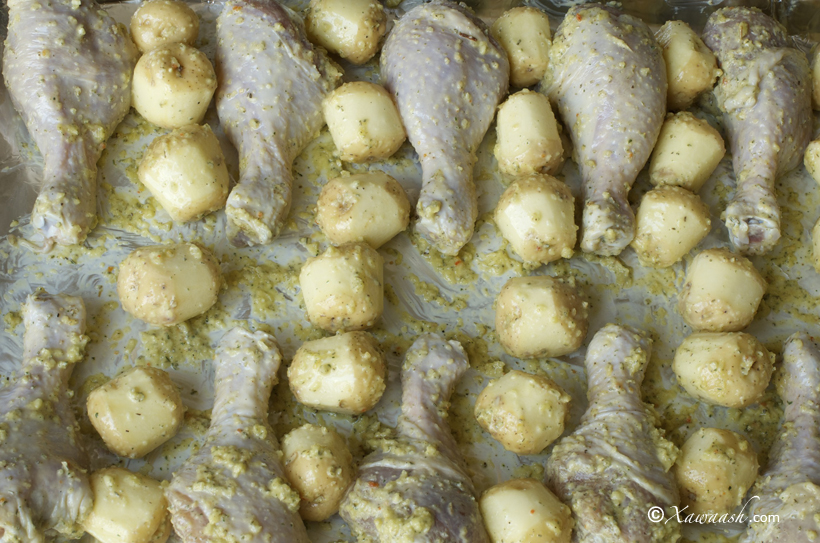
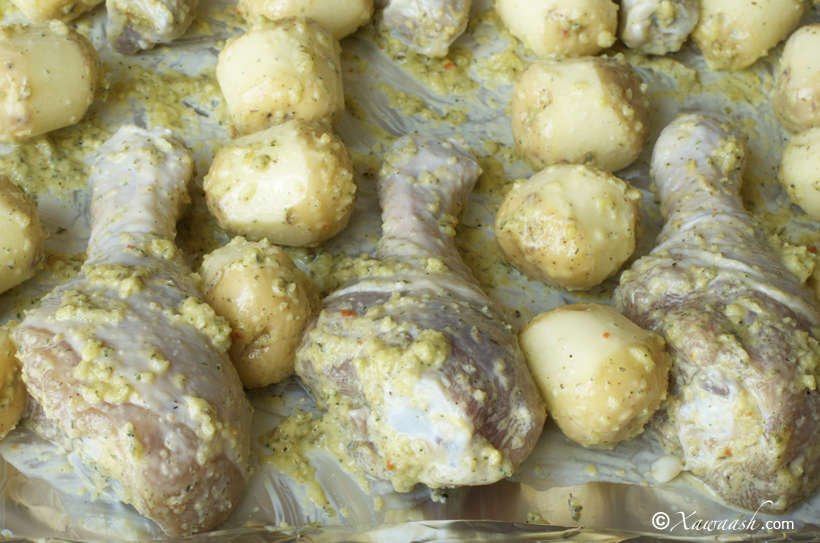
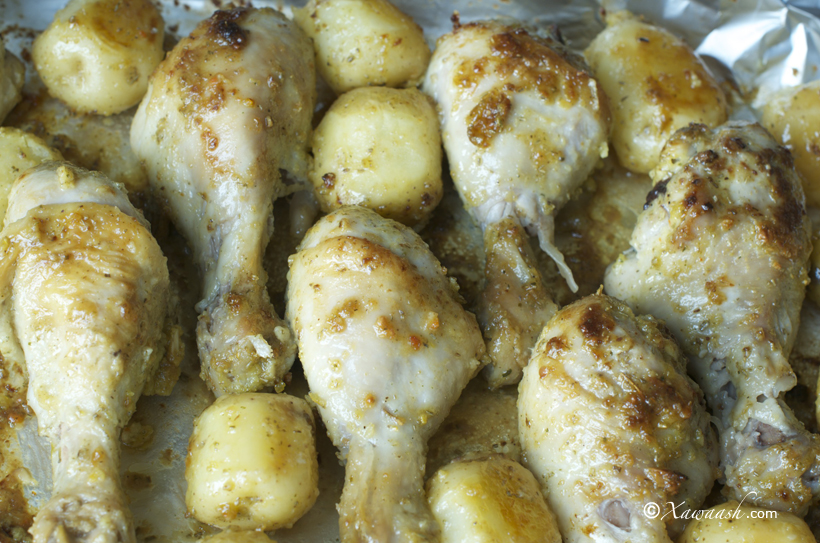
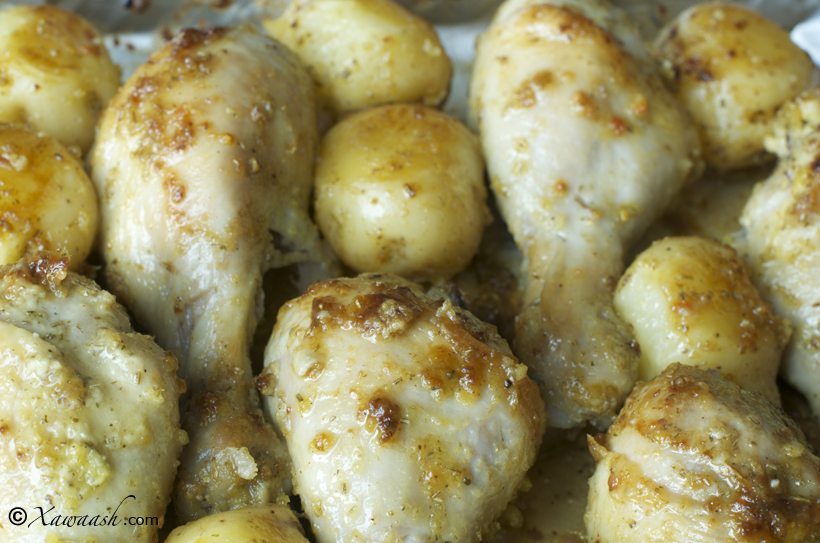
]]>

